

F OOTPRINTS S AMARITAN’S F EET
HOW COVID-19 CHANGED EVERYTHING ISSUE NO. 2 THE RE-LAUNCH OF DOMESTIC MISSION TRIPS SEE HOW SHOES STILL MADE IT ACROSS BORDERS
CREATING A WORLD WITH ZERO SHOELESS CHILDREN.
HERE AT SAMARITAN’S FEET INTERNATIONAL WE KNOW THAT HURT AND HOPE CAN CO-EXIST; WE HAVE SEEN THIS FROM ACROSS THE GLOBE AS WE SERVE ALL RACES, RELIGIONS, AND SOCIO-ECONOMIC SECTORS.
WE ALL HAVE A ROLE TO PLAY, WHICH REQUIRES US TO EQUIP AND EDUCATE OURSELVES, HAVE THE HARD CONVERSATIONS, AND STAND UP TO INJUSTICE.
WE MUST STAND IN THE GAP FOR THE MARGINALIZED, DISPLACED, AND MISTREATED—WE DO NOT REMAIN SILENT. WE CONTINUE TO COLLABORATE WITH ALL RACES, RELIGIONS, AND SOCIO-ECONOMIC DIVIDERS TO BRING ABOUT TRUE EQUALITY. LASTING CHANGE COMES FROM RELATIONSHIPS AND A WORLDVIEW OF FRIENDS THAT DON’T ALWAYS LOOK LIKE WE DO.
WE BELONG TO EACH OTHER.
FROM THE FOUNDERS
Who would have thought that the world was going to stop? That there would be regulations on how closely we could stand next to each other; that we wouldn’t be able to cross borders?
All of this altered the plans and efforts of Samaritan’s Feet this year, but it didn’t stop us. Because, despite what this pandemic has done, we still have a duty to leave this world better than we found it. So, we came together, we shifted, and we innovated.
People from around the world began submitting Hope Notes so that we could continue to give hope and encouragement to those in need, even though we couldn’t tell them face-to-face. We hosted drive-through micro-distributions where we gave out Hope Totes, bags filled with shoes, a hygiene kit, a Hope Note, and ideas on how to be kind and well during such an uncertain time. We re-launched domestic mission trips so teams could serve their neighbors in need while we weren’t able to cross international borders. Our global family was eager to serve in their countries as we continued to send containers of tens of thousands of shoes to them to distribute. Partners, donors, and volunteers continued to stand by our side because they believe in the mission.
We set an audacious goal at the beginning of 2020: serve 1,000,000 people. And just over 10 months into the year, we’re well on our way to that goal as we have served over 700,000 and projected to serve 1,000,000 by the end of the year. A pandemic couldn’t stop what God was doing through Samaritan’s Feet this year!
Winston Churchill said, ‘never waste a good crisis.’ So during this time, we’ve been able to pause and refocus to think strategically about the organization three, five, 10 years from now. What will Samaritan’s Feet 2.0 look like?
As a result, we’ve created our Capital Campaign which includes plans to increase our capacity in the United States (new headquarters), maximize efficiency in global delivery (new international headquarters, World Shoe Generation II, and micro-manufacturing), expand experiential education (Global Servant Leadership Institute, school programming, and Shoezeum), and ensure sustainability. This $40 million “Blueprint to Scale Impact” allows us to grow into the future and we are grateful that Sanford Health has invested in this campaign with a donation of $5 million.
So, we thank you for your continued partnership and support this year. We hope that the stories through these pages serve as a reminder that your generosity is making a difference, and that we are indeed leaving the world a little better than we found it.
In Humble Service, Manny and Tracie Ohonme
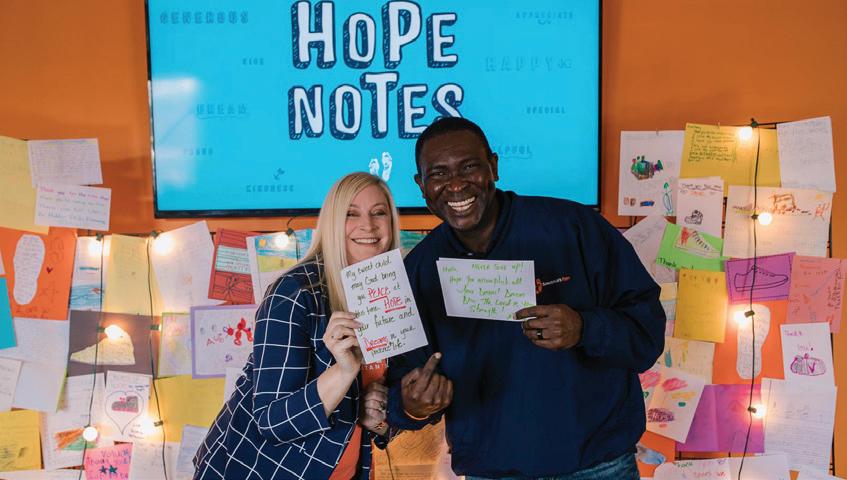
IT ALL STARTED WITH A PERMISSION SLIP.
“As I think about those events, I get chills from head-to-toe. They were eye-opening, heart-breaking, and joyful,” Hayes said.
Shelley Hayes, Corporate Health and Wellness Manager for West Tennessee Healthcare, was helping coordinate a field trip for sixth graders to a large farmer’s market and Wellness Center in Jackson, TN. The Wellness Center manager suggested to Hayes to put tennis shoes as a requirement on the children’s field trip permission slips.
“As I mentioned that to the school contact, she said, ‘Well, I will. But I’ll tell you right now, we have children here that wear flip flops year-round. They just don’t have anything else.’ So right then, my heart sunk,” Hayes said.
In 2018, the Tennessee Commission on Children and Youth reported that over 21% of children in Tennessee (or approximately 322,600 children) live in poverty. Hayes, a mom of three, immediately knew she wanted to do something about this. “I can’t imagine a child trying to participate in P.E. or having to wait on the bus in frigid Tennessee weather wearing flip flops,” she said.
After a few different fundraising efforts and ideas, things started to really come together when Hayes joined the Rotary Club in 2018.
“Our district governor came down and said, ‘We’ve got three Rotary Clubs in our town. Have y’all ever thought about a group effort to do one big project?’ I tried to contain my excitement once she said that,” Hayes said.
Hayes pitched the idea at the next Rotary Club board meeting and not long after, they were planning three shoe distributions at schools in Jackson in the winter of 20192020. They would end up serving over 1,300 children with a new pair of athletic shoes and socks.
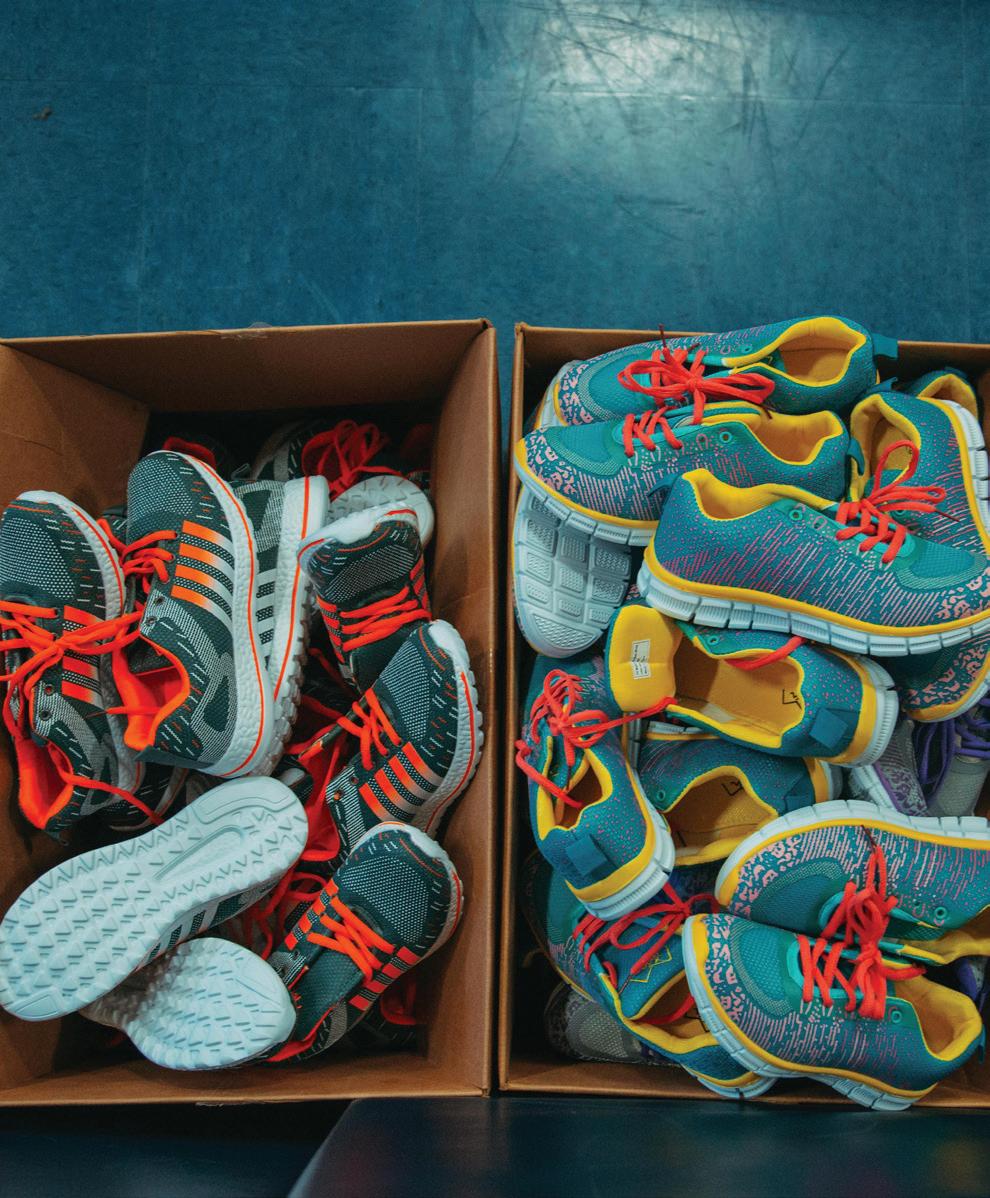
She recalls one young girl who seemed embarrassed sitting in front of her. At first, she didn’t want to take off her shoes, but began warming up to Hayes. The young girl leaned forward and whispered, “Mrs. Shelley, I don’t have on any socks.” Hayes replied and said, “That’s ok, you’re going to get a brand new pair today!” After the young girl got her new socks and shoes, she gave Hayes a big hug. Later in the day, the older sister of the girl also came in with new socks, and the team was excited to give an extra pair or two to the family.
“We know the socks and shoes are important, but so are the conversations. These kids will never forget the words you spoke to them,” Hayes said.
CLUBS COME TOGETHER TO SERVE COMMUNITY
ROTARY
Hayes remembers sitting down with a little boy she served, and the conversation went something like this:
Hayes: What do you want to be when you grow up?
Young Boy: I want to be a Police Officer!
Hayes: Really? You would make an amazing Police Officer!
Young Boy [looking inquisitive]: Why do you say that?
Hayes: Because YOU are awesome!
Young Boy [leaning back]: I am awesome?
Hayes: Absolutely, you are awesome!
The young boy, now firmly believing he is awesome, leans to the kid next to him and says, “Hey man, I am awesome!” Then turns to another volunteer, ‘I’m awesome.” And, even as he leaves the gym, is telling everyone that he is awesome.
Moments like this happened for over 1,300 children in Jackson—children no longer being embarrassed about their shoes and children getting a boost in confidence.

And it all started with a field trip permission slip.
- SHELLEY HAYES
“We know the socks and shoes are important, but so are the conversations. These kids will never forget the words you spoke to them.”
CORPORATE HEALTH AND WELLNESS
WEST TENNESSEE
1 CHILD IN 6 LIVES IN POVERTY; THAT’S 11.9 MILLION IMPOVERISHED CHILDREN IN THE U.S. children’s defense fund, 2018.
MANAGER
HEALTHCARE
LEADING THROUGH COVID-19
This year was different. It called for change and innovation. Read what Samaritan’s Feet co-founders Manny (M) and Tracie (T) Ohonme had to say about how COVID-19 impacted the organization, how the team rallied together, and what they learned through it all.
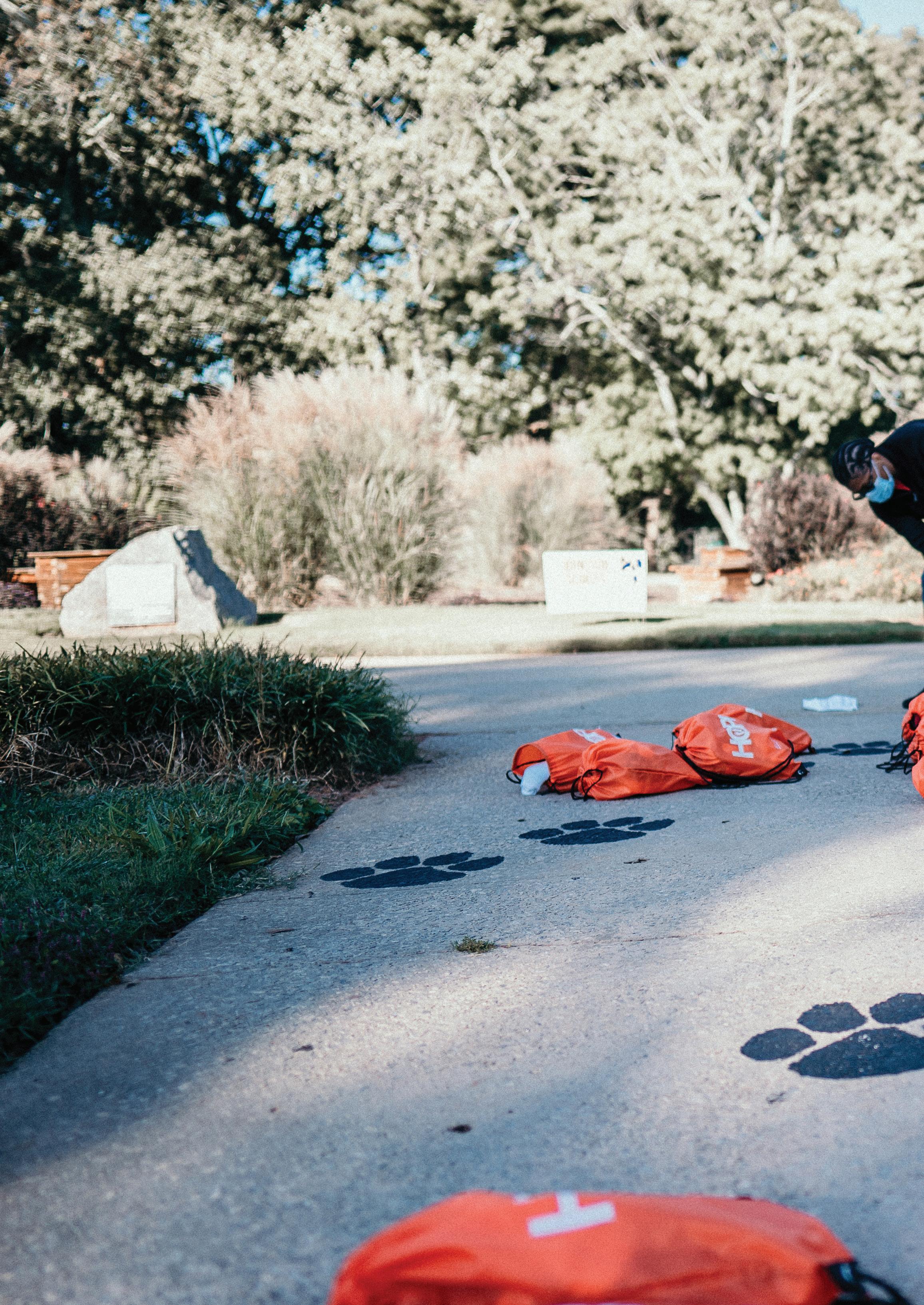
What impact did COVID-19 directly have on Samaritan’s Feet?
M: We looked at ourselves and said, ‘my goodness,’ because our model is centered around being in contact with people, and now we’ve got to live in a world that is contact-less. We have to work in a society that is really concerned about safety and the fear of what could happen because of the mystery of this virus. You have people confined to their homes. And we were not immune to that. We had to shut down our warehouse. We had to shut down every single international mission trip. Then we came together and said, ‘what are we going to do?’
A CONVERSATION WITH THE CO-FOUNDERS
- TRACIE OHONME CO-FOUNDER
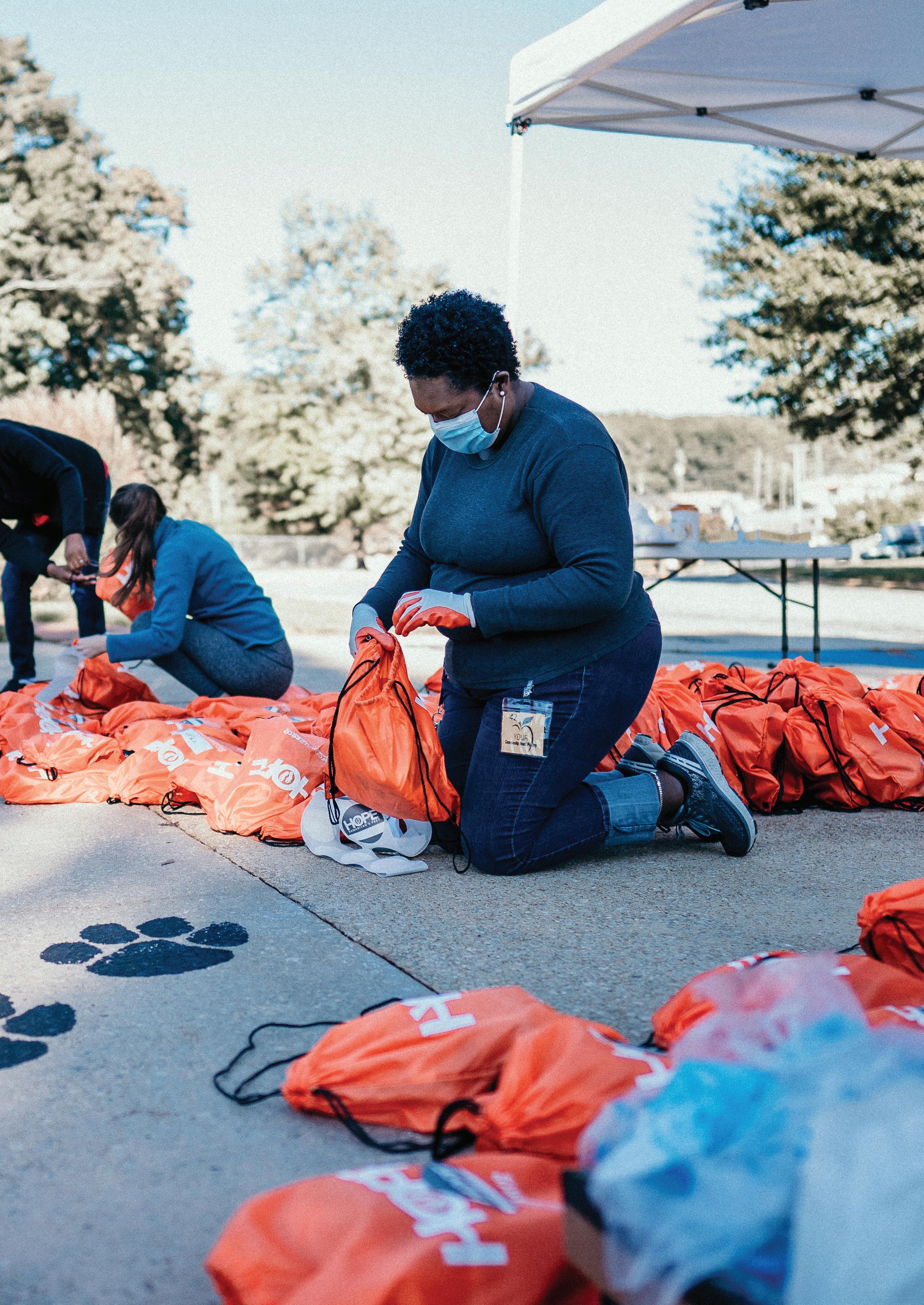
“We’re not just teammates, we’re family and we look at the world as our global family. We’ve seen resiliency, determination, loyalty, perseverance, and above everything, there is heart.”
SAMARITAN’S
FEET
What were the first steps of addressing that question, ‘what are we going to do?’

T: We talked in our office about the episode of Friends with Ross as he is moving the couch upstairs and he keeps yelling “pivot!” That’s what our team and partners did, we pivoted. When the world started to change, we were still able to take our own unique model, but pivot to adjust it for the time we are in.
M: Tracie is right, we had to rethink how we do things. We had to innovate. We had to think about how we can still have impact, how to create hope, how to create opportunities for people to feel like they are a part of something bigger. I realized the only way we’re going to get through this was to come together as a team.
Share a little bit about how the team came together.
M: Our team sat down and said ‘what can we do differently to be effective in the midst of this pandemic?’
T: The team is really what helped us pivot. We’re not just teammates, we’re family and we look at the world as our global family. We’ve seen resiliency, determination, loyalty, perseverance, and above everything, there is heart.
M: I don’t think we realized how intrinsically important what we do as an organization is to our staff. Sometimes we get into this mode of executing and operating, which we’re called to do with passion, but we started seeing our team members really miss serving. When we pivoted and started doing domestic mission trips [since international trips were cancelled], you should have seen everyone that wanted to go on it! That’s the power. We’re not just employees, we’re a conduit that God uses.
What were some of those other innovations that came through that pivoting?
M: We found ourselves creating micro-distributions and expanding the vulnerable populations that we serve. Traditionally, we serve mostly children. Now we see the homeless, parents, and veterans really struggling. There was a need to serve people who don’t know where their next paycheck is going to come from. And kids don’t stop growing just because there’s a pandemic. There was a way for us to still meet those needs.
T: We created our Hope Notes initiative where people were able to write in and encourage people. And we added our Hope Totes to our distributions, filled with things people needed like a message of hope, hygiene kit, shoes, a note with how to be kind and be well.
M: We still wanted to ensure people felt valued.
As a co-founder and leader within Samaritan’s Feet, how did you handle leading during such an uncertain time?
M: First, we were living in a world that was becoming more isolated and second, we were living in a world where people weren’t treating people the way they were meant to be treated. Then on top of that, people you know are suffering and dying from COVID-19. There were times when I just had to cry, when I felt like I lost control, when I just didn’t know what to do. I was reminded of a phrase from Joseph in the Bible, ‘I don’t know what to do, but my eyes are on You.’ We know that God has us and this is His mission. We know we have a team that believes in the mission. We share trust with our team. It wasn’t up to Manny or Tracie to figure out where is the road to get us through this, we all rolled up our sleeves and said we’re in this together. That gave us hope.
 MANNY OHONME CO-FOUNDER
MANNY OHONME CO-FOUNDER

“ When you see your brother is hurting in Kenya, you can feel the impact here in Charlotte, N.C. We’re more interconnected than we thought. We feel the burden because we are called to serve in the world. So we’re looking forward to continuing to serve. ”
-
SAMARITAN’S FEET
T: Knowing our team was behind us and was optimistic, that fueled our energy as leaders to say if they’re pressing on, then I’m pressing on with them.
What have been some good little surprises to come out of this pandemic the last few months?

M: Winston Churchill said, ‘never waste a good crisis.’ Because of this crisis, we’ve been able to really pause so that we can be forward thinking. It’s allowed us to refocus and think more strategically about the organization three, five, 10 years from now.
T: Every year we have a theme internally for our team. And this year it was vision. One thing that COVID-19 has allowed us to do was peel back some layers and look a little deeper into the visions for the organization
M: We’ve seen our donors and partners stick with us. We’ve had our international affiliates step up and say ‘send us containers! We’ll help distribute the shoes!’ We realized we were a true family. For us to have a unified community, a community that’s healed and together, we’ve got to do it together. So we’ve found different partners, other NGO’s to come alongside us so that we can go into communities together to serve. Because for us to have true long-term impact, we’ve got to collaborate.
So, what’s next?
M: As I look to what’s happened in 2020, I feel very optimistic knowing that we’ve got the right tools, vision, leadership, board, and supporters. Thinking back to March when we didn’t know what the world was going to be like, then fast forward seven months later and we’ve served over 700,000! That result is amazing. In spite of what this pandemic has done, we still have a role to leave this world better than we found it.
T: I can’t wait to see what 2021 brings, I think it’s going to be a phenomenal year, just like 2020 was for Samaritan’s Feet.
M: As an international non-profit based in the U.S., we knew we were called to a global cause. COVID-19 allowed us to see that we are globally connected. When you see your brother is hurting in Kenya, you can feel the impact here in Charlotte, N.C. We’re more interconnected than we thought. We feel the burden because we are called to serve in the world. So we’re looking forward to continuing to serve.
THE LOST BOYS
After a long, winding drive through the lush green mountains of Jamaica, we came to a fork in the road. There were no legible signs directing us, so we had to call for directions. We made our turn onto a narrow dirt road and headed down a steep hill. As soon as we rounded the corner, barefoot boys began running along with our van, jumping on it as we got closer to their home. Their big smiles pressed up against our van windows revealing they were eager for visitors. They were ready for us.
We had arrived at the Mount Olivet Boys Home in Walderston, Manchester, Jamaica. This is a home for boys between the ages of 7 - 17 who even in their short lives, have faced challenges like abuse, unstable living conditions, or poor behavior. These boys have endured things in life that are unfathomable. But they are here, protected, and together.
With not even a foot on the ground as I went to exit the van, I received waves, smiles, and hugs. We began setting up our shoe distribution and the crowd quickly grew as boys were curious of the visitors. There was a long, loud line of boys anxiously awaiting interaction with strangers.
I sat down on a pile of old 2’ x 4’s and noticed a few nails and screws from the construction site nearby. I swept them away to protect the little feet that would soon be in front of me.
Each boy who sat in front of me had a dream—pilot, soccer star, teacher, pastor. They were proud to tell me about high scores on recent math tests, delighted to talk about their favorite sports, and hungry to be prayed for. So much so, that some boys came back and asked to be prayed for again.
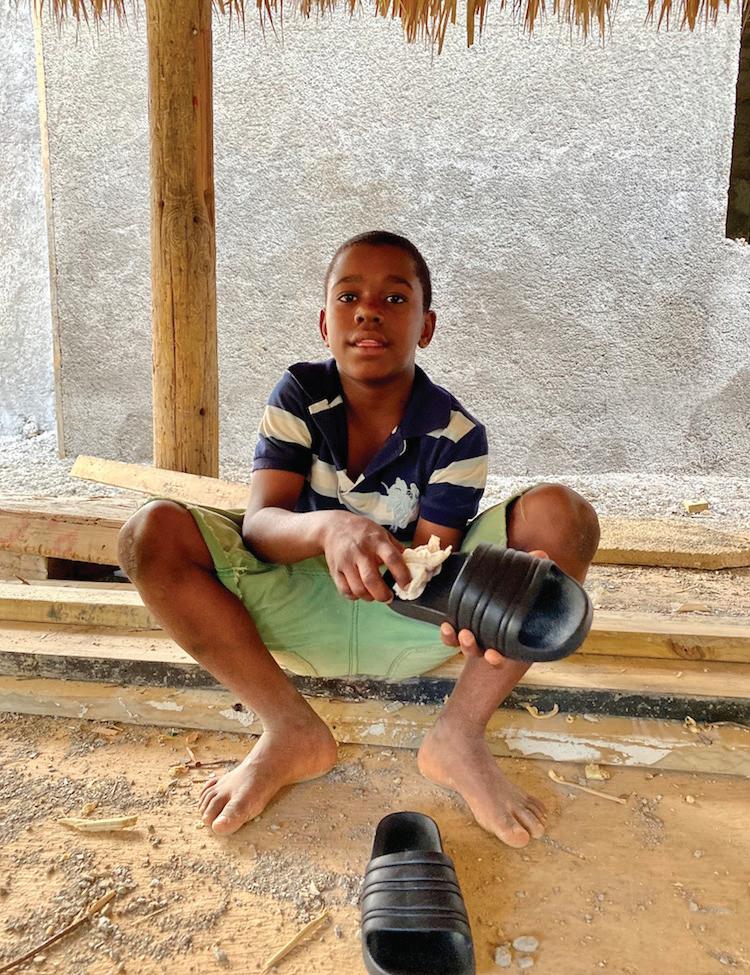
“These boys were starved of a loving, caring, and positive childhood, so this time together was a way to show affection and make them feel like they belong. This is the medicine that they lack growing up in toxic family environments,” Patrick Newman, Director, Mount Olivet Boys Home, said.
One boy I served came back several times and sat next to me, each time asking for a wipe. He had gone off to play with his friends and kept getting a little dirt on his shoes. But he wanted to protect them, so he cleaned them after every wear. These shoes meant something to him and he wanted us to know that, too.
“A new pair of shoes for any child is always a joyful experience. However, for the boys here who do not have the love and support of parents and families, this means so much more to them. The smiles and the joy they felt could be seen days after as they continued to wear their shoes with pride. This has impacted their lives tremendously, as in most cases they would be barefooted,” Newman said.
The next several moments were filled with more hugs than I could ever count. When they hugged, they hugged hard. When they held your hand, they held on tight. When they had conversations with you, they were enthusiastic. They squeezed in for pictures and they put their tiny hand on your shoulder as you stood next to them. They asked us to write down their name and what they wanted to be when they grow up so we could pray for them.
They also asked us if we would visit again—because they didn’t want to be forgotten. They wanted to be seen and heard.
I’ll never forget what I saw and heard. Their strength and spirit was inspiring. Their gratefulness for a simple pair of shoes and prayer was humbling. Their tender and honest hearts stirred my own heart. And I’ll never forget the boys at Mount Olivet Boys Home.
A TEAM MEMBER’S JOURNEY TO JAMAICA
“A new pair of shoes for any child is always a joyful experience. However, for the boys here who do not have the love and support of parents and families, this means so much more to them. The smiles and the joy they felt could be seen days after as they continued to wear their shoes with pride. This has impacted their lives tremendously, as in most cases they would be barefooted.”
- PATICK NEWMAN DIRECTOR MOUNT OLIVET BOYS HOME
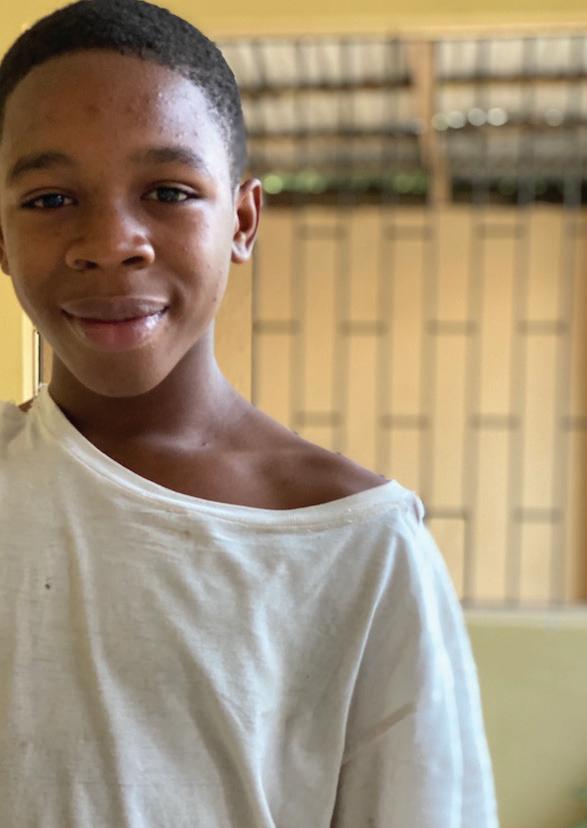
WAREHOUSE KEEPS THE MISSION GOING
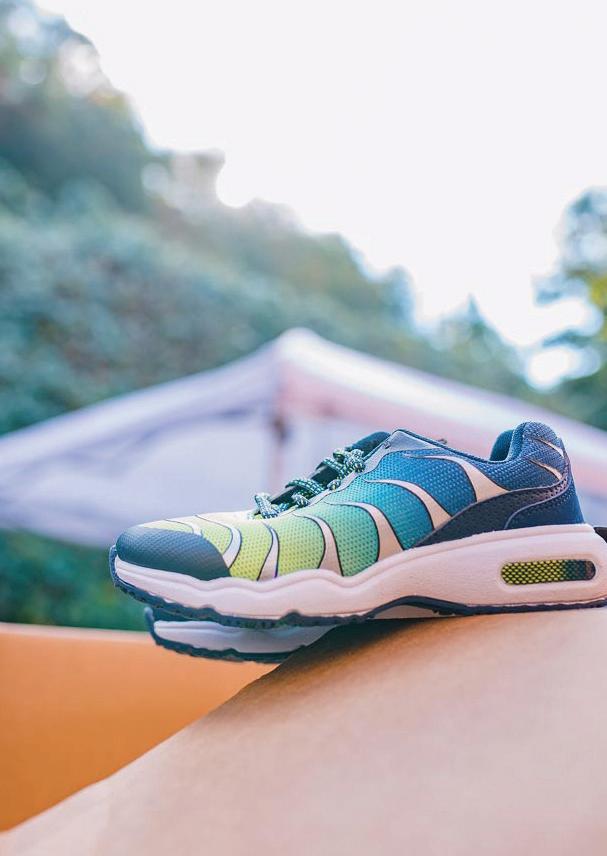
Larry Davis, Warehouse Associate, Samaritan’s Feet, said.
As COVID-19 began spreading throughout the United States, many organizations and companies were faced with a lot of uncertainty. But Samaritan’s Feet knew that now, more than ever, there would be a need. Partners in third-world countries were reporting that businesses were closing, people were losing jobs, and the financial impact of COVID-19 would take years to recover from.
BRING YOUR FAMILY AND FRIENDS TO JOIN THE WAREHOUSE GUYS. FIND OUT HOW AT: WWW.SAMARITANSFEET.ORG/GO
“COVID-19 stopped a lot of things, but it didn’t stop the need for shoes,”
So, the Samaritan’s Feet warehouse team got to work.
“Even though COVID-19 was weighing heavily on so many people, it was more about the mission,” Derrick Parker, Warehouse Manager, Samaritan’s Feet, said. “Shoes are a source of life for children in other countries. They need those shoes. So the guys in the warehouse, we kept thinking about them. That was our priority.”
All of the guys on the warehouse team have experienced shoe distributions, both in the United States and internationally, and they used those memories to motivate them during this complicated time.
“The warehouse guys came together as a team to really focus, work together, and be successful to meet a basic need. I am very proud to be a part of that team,” Cedric Little, Warehouse Associate, Samaritan’s Feet, said.

From February until September, the warehouse team pulled, packed, and shipped approximately 460,965 pairs of shoes out.
460,965
That’s 460,965 individuals who have one less thing to worry about during a very worrisome time. To put things into perspective, 460,965 pairs of shoes is about 30 containers. In order to pack a container of shoes properly, it will take five people about 10 working days. The warehouse team was working long, hard hours to make sure the mission of Samaritan’s Feet continued on, despite a pandemic unlike anything seen in over a century.
“We were relied on heavily. It’s a major responsibility to take on, but we took pride in making sure we could meet those needs. It’s a humbling feeling for us guys to be a part of that and to help someone that may be a little less fortunate,” Little said.
“These shoes are going to mean so much to people in countries that have been hit hard by COVID-19. I’ve been talking to some of our partners and they just can’t wait to pass them out, they are in dire need of them,” Davis said.
Although the warehouse team was incredibly busy during those months, they were also full of smiles while working with one another.
“We cut up all the time,” Little said. Parker added, “That is true. We get to have fun working here together.”
They also smiled knowing they were making a massive difference in the lives of others. The warehouse team has a hand in packing nearly every single shoe that is shipped around the world, so they love hearing about those who receive them.
“It makes me feel good when volunteers, distribution leaders, and team members come back with stories. They’ll tell me about a kid that really loved his pair of shoes and was just so happy with them. And then I think, ‘wow, I pulled that pair of shoes for him,’ and that makes me feel good,” Davis said.
Many of the international partners of Samaritan’s Feet wait anxiously for their shipment, because they know firsthand the impact the shoes will have on their community members: they will help individuals work safely so they can provide more for their families, they will allows children to comfortably get an education, and they remind those in need that someone cares about them.
Parker added, “It feels so good to make those dreams come true for our international partners. It’s a lot of work, but we thank God for giving us the strength and ability to do it.”
PICTURED LEFT TO RIGHT: LARRY DAVIS, DERRICK PARKER, CEDRICL LITTLER
A TRIP AROUND THE WORLD
With borders closed and significant quarantine procedures in place, COVID-19 impacted the ability of Samaritan’s Feet to send mission teams internationally. We talked to three of our international partners where mission trips had to be postponed this year. Read what our teams, shoes, and time together mean to them, and also see how COVID-19 has specifically impacted their communities. Samaritan’s Feet missed sending teams to these countries and is looking forward to carefully, and safely, planning trips there again soon. But for now, please meet Derrick, Maria, and Matthew.
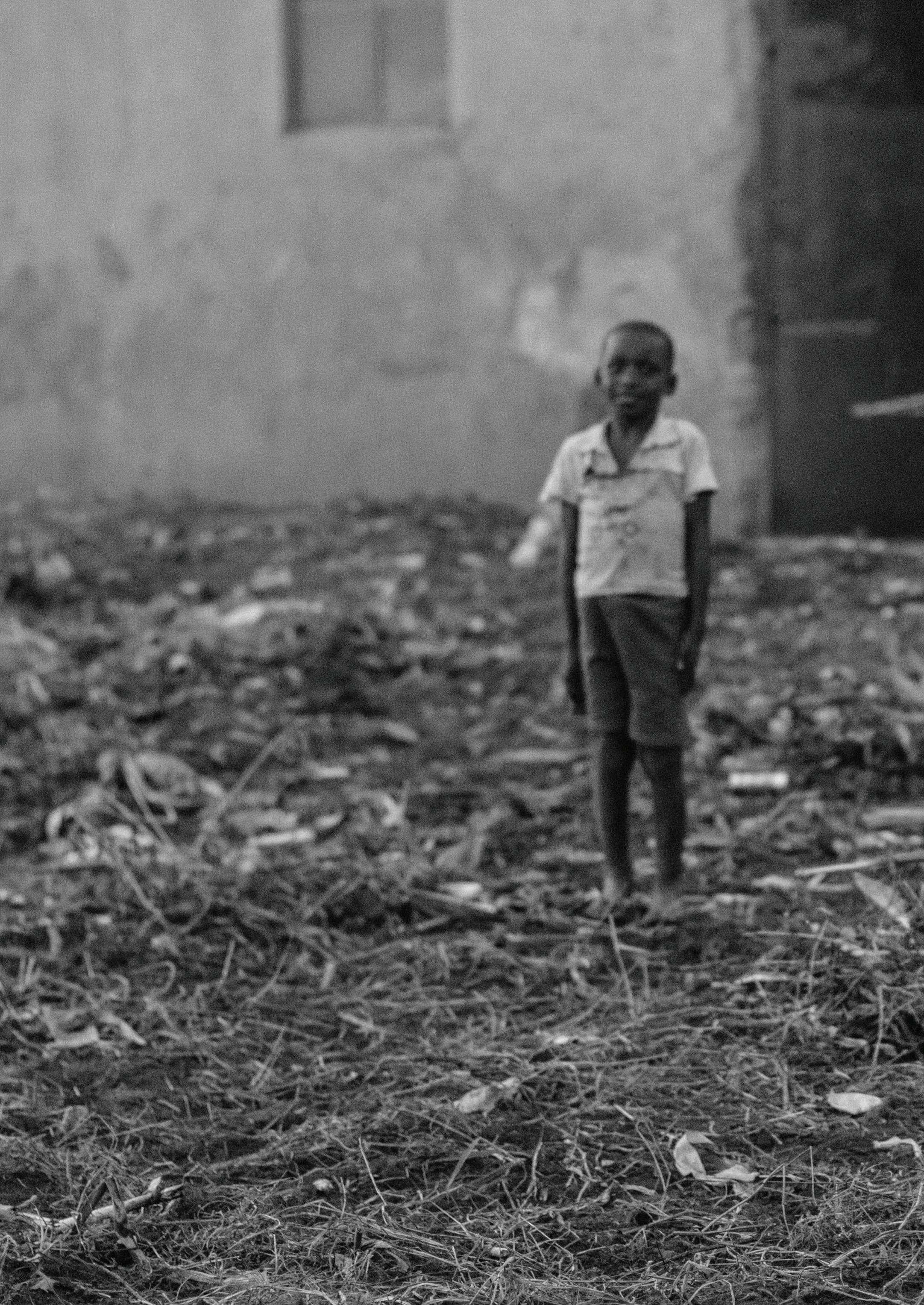
CONVERSATION WITH OUR INTERNATIONAL PARTNERS AND HOW COVID-19 HAS IMPACTED THE COMMUNITIES WE SERVE THERE.
A

Derrick Pitts (DP) in Belize: Derrick and his wife Valentine are the co-founders of God Cares Outreach in Belize. They have been in operation for 10 years and their vision is to see Belize transformed through the love of Christ one community at a time. Their strategies of engagement are: reach the kids (feeding programs, educational assistance, and medical care), connect the parents (home visits, job opportunities, training programs, and peer groups), and impact the community (community rehabilitation and community outreach).
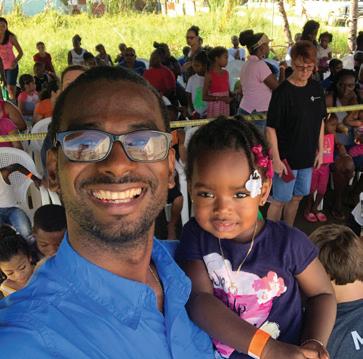
Maria Melgarejo (MM) in Honduras: Maria founded the organization GLOW in 2016 with the help of a talented board of directors. GLOW stands for “Go Love Our World” and they currently support those in need specifically in the areas of education, health/hygiene, and spiritual development in Honduras. They have a holistic approach to connect existing resources with at-risk communities in order to improve lives and bring hope.
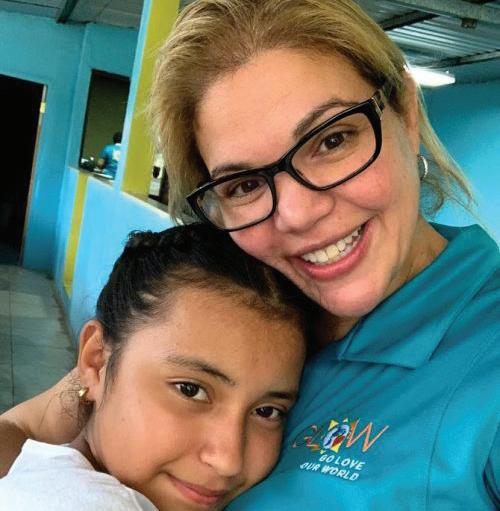
Matthew Atokple (MA) in Ghana: Matthew is the founder of Feed the Generations in Ghana. Feed the Generations focuses on agricultural development and sustainable harvesting to permanently meet basic needs while also establishing trust and developing strong relationships within the community. Their farming creates employment opportunities and their harvests ensure the needs of the local community are met, with excess being sold at a discounted price to other organizations.
Tell us a little bit about the community that you serve in.
DP: Most of the communities we serve are inner-city communities, on the south side of Belize City. Most of these areas are povertystricken and gang-infested and have high rates of single moms, school dropout, teenage pregnancy, and prostitution/child prostitution. The south side has the highest HIV/AIDS rate in the country and is considered a “forsaken” part of our city.
We also serve in rural communities, the indigenous Mayan communities. They are very cultural people who live in the jungle and are somewhat removed from modern civilization. They live in thatch roof houses without concrete flooring, grow their food in their backyard, and wear their cultural attire.
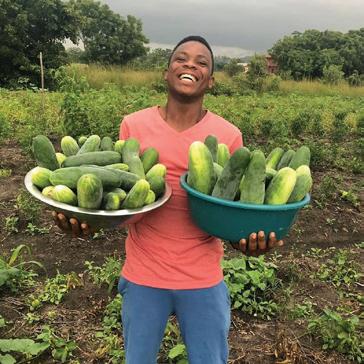
MM: We currently serve in poor villages in Honduras, focusing in El Eden, El Ocote, and nearby areas through church partnerships. Our main projects and outreach are providing student sponsorships, a soup kitchen that feeds approximately 95 individuals, and supporting a local special needs school. Other things we do includes providing shoes and other items like water filters, dental kits, and Bibles, building homes for families in need, and offering health and hygiene trainings.
MA: Ghana is one of the most beautiful countries in West Africa with some of the most amazing people who are very hospitable. Ghana is blessed with lots of natural resources, but there is a huge gap between the rich and the poor. This makes life comfortable for the rich at the detriment of the poor. We work with other organizations to provide holistic restoration for children rescued from child labor and trafficking that surrounds the largest man-made lake in the world called Lake Volta.
[Editor’s Note: The people who live around Lake Volta are extremely poor. Fishermen began luring families in that area with promises to provide for them if they allowed their children to work on the lake. In return, they would pay the family and their children would get an education and meals. Some families truly thought they were doing something good for their children, others completely sell their children to the fishing operations.
Unfortunately, the children are forced to swim, but many of them don’t know how. The lake also contains a large forested area which children can get stuck in and drown. Many of the families who were tricked into letting their children go with the fishermen, never see them again.]
We rescue kids who were displaced on the streets because of divorce or conflicts between their parents at home. We also distribute food to the needy in communities and villages as a way of expressing Christ’s love to them.
What are the needs in these communities?
DP: In the midst of all the hopelessness in the south side inner-city, there are kids with big dreams, single moms with huge goals and ambitions, and some of the most loving and appreciative people I have ever worked with. As a matter of fact, I am a product of the south side. My heart goes out to these communities because I know there are many little “Derricks” just waiting for an opportunity and to hear that there is a God who loves him. For those in the indigenous Mayan communities, they have many needs—from medical care to basic needs such as a shoe. Many of them walk barefooted throughout the jungle.
MM: The areas we support are filled with poor families that work mostly in day labor positions and depend on the land for their meals. They are wonderful people who live day to day hanging onto hope for better days ahead.
MA: Life is challenging for the people of Ghana and has caused many of them to make some poor choices that affects others. Sadly, child labor, trafficking, neglect, and abandonment are common, along with starvation, hunger, and abuse to many children across the country.
48% of small businesses have closed permanently. 600,000 employees have been let go from their jobs. 67% is the current unemployment rate in the country. 6,600,000 people living on $2 or less every day.
How has COVID-19 impacted the need in your country?
COVID-19 Statistics in Honduras
DP: With tourism being one of the main economic engines and COVID-19 shutting down all of our borders, not allowing tourists into our country has really affected our country. Many individuals were released from their jobs and many businesses suffered great losses.
The government scrambled for funds to make sure our people were fed. School was closed which added mental stress for many households as children were now home. Families were becoming hopeless and desperate. For a small country like Belize, the

spread of COVID-19 happened rapidly. So, we have had strict measures that even impacted our agricultural sector. Overall, it has affected our economy badly and it may take years for us to recover from this hit.
MM: The country of Honduras as a whole is suffering horribly. Due to COVID-19, the country has mostly been shut down. Individuals who worked day labor have struggled to find work, the already inadequate medical facilities are overcrowded to the point where many are dying in the hallways for lack of treatment, and the overall poverty is worse than ever. It’s been heart-breaking for us to hear daily stories of suffering from those who have become like family to us. At the beginning of August, the Honduras news agencies reported that it would take five years for the country to return to pre-COVID-19 levels economically and shared this:
MA: COVID-19 has had huge socioeconomic challenges on the lives of great majority of Ghanaians. Education on various levels were suspended and the cycle of education was totally disrupted, this ultimately left many teenagers who were in school pregnant. It’s heartbreaking to see how stranded, hungry, and starving people are, not knowing where their next meal comes from. I got the opportunity to serve with one other organization to provide daily packed lunches to the vulnerable and less privileged within Accra during the lockdown. Children’s homes and orphanage homes have restricted access to people visiting as a measure of protecting kids and staff from the virus. The international and local borders were shut down which restricted the movements of people locally and internationally. There is severe hardship, fear, and uncertainty of what’s next which left many asking lots of questions about faith and what they are here on earth for.
Samaritan’s Feet was not able to send a team to your country this year, as planned, due to COVID-19. What impact did that have?
DP: Every year, our partners look forward to Samaritan’s Feet coming alongside them and spreading a message of hope and love to the communities. Samaritan’s Feet has been a blessing to thousands of children and adults, and also to the in-country host. As a ministry, Samaritan’s Feet is the highlight of our year—to have people highly motivated to serve the least of these is such an encouragement to the local community and a clear picture of who Jesus is. To say the least, we missed having a Samaritan’s Feet team this year.
MM: Having Samaritan’s Feet teams join us is always a blessing on many levels. Knowing we weren’t going to be able have the teams this year to impact many local communities with shoes was sad because they really need them and they look forward to the Samaritan’s Feet teams. But more than that is how the teams bring the love of God. My personal favorite is seeing how it touches both the recipients of the shoes and the team members. There is nothing like sharing love and hope to those who think they have been forgotten in society.
MA: Many of the children in communities and organizations here had high hopes that they were going to get new shoes for school. Leaders of organizations were very expectant of the upcoming partnership, but because of COVID-19 was not fully actualized. We are all very hopeful for this partnership in the coming year.
What does it mean for a mission team to come serve people in the communities you’re involved with?

DP: In the south side of Belize City, people feel forsaken. They are stereotyped as criminals, not educated enough, and not good enough. But to have Samaritan’s Feet come and sit in one of the most humble positions and wash the feet of these individuals, they look them in the eye and ask them what they want to be in life, and breathe hope upon their dreams. As we watch their reaction, we know that there are seeds planted that have yet to blossom. What Samaritan’s Feet does for the people in the south side goes deeper than just passing out shoes—it speaks life into dead areas, it breaks generational curses, it lifts a head up that has been hanging low for years, it puts a smile where there was anger and hatred, and it brings light to a dark tunnel. Samaritan’s Feet makes dreamers continue to dream and shoot for the best that God has for them.
MM: Having teams serve the communities in Honduras brings hope and it allows people to know and see the love of Christ. Seeing others serving them is a very humbling experience. Our ultimate goal is for those we serve to come to know Christ as their Savior, for that is really their greatest need. And helping to meet their basic physical needs, hopefully they will realize the love Jesus has for them.
MA: For mission teams to come to Ghana and serve in the communities I serve in communicates volumes. It shows that someone is thinking of them as they travel that far to come see them. It shows that God remembers them and meets their needs through these missionaries. It shows the people in these communities that they are loved and valued and then they feel hopeful.
Please keep Belize, Honduras, and Ghana in your thoughts and prayers, along with our partners Derrick, Maria, and Matthew, as their countries recover from the devastating impact of COVID-19. Like them, we have greatly missed sending teams to serve internationally. We hope you consider joining us as we prepare to serve internationally again soon.
WWW.SAMARITANSFEET.ORG/GO
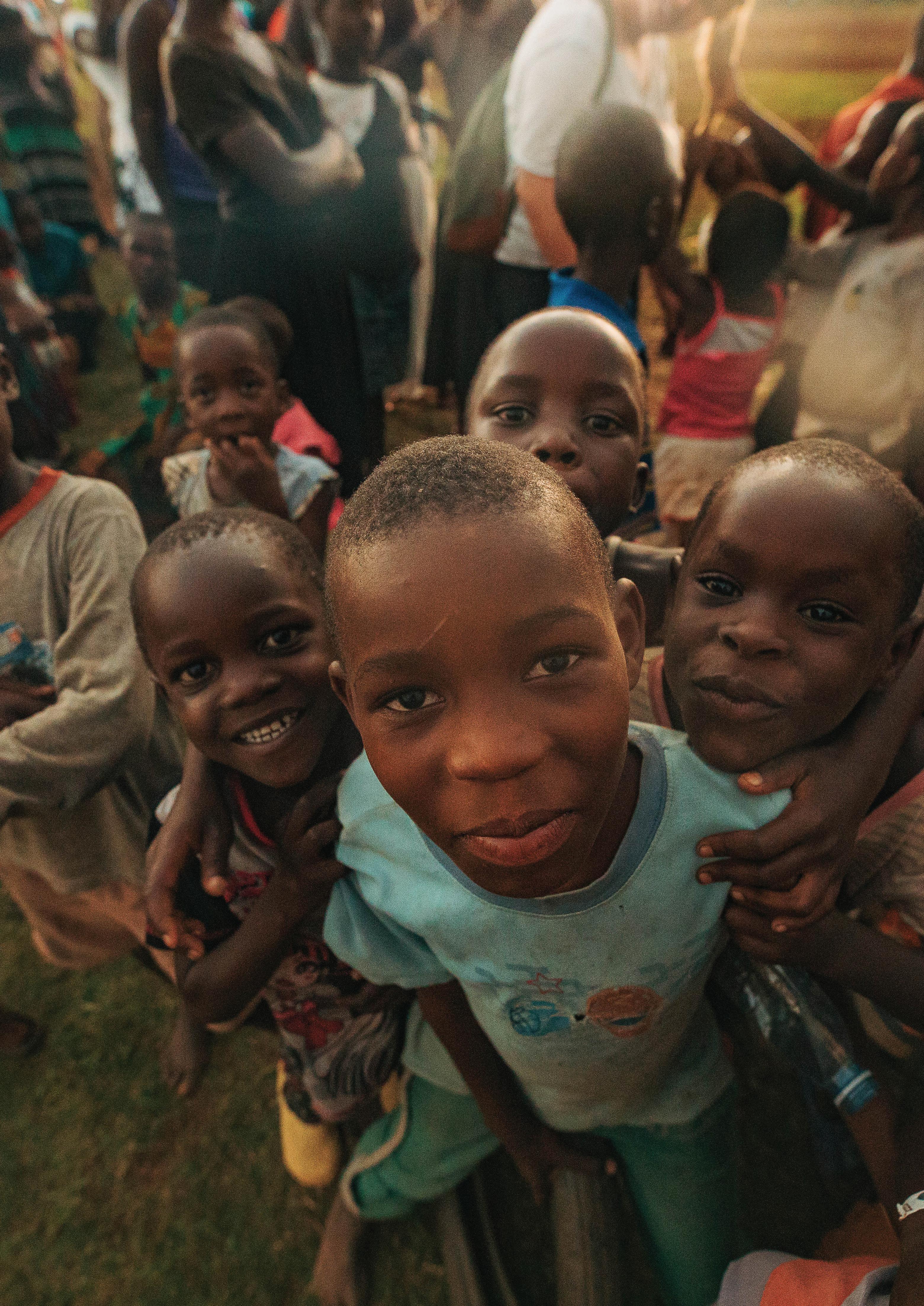
YOUR WORDS MATTER
Although life looks different today compared to what it was last year, there are still people who are struggling daily and in need. Many organizations are getting creative on how they can continue to serve their community and still meet those needs.
In one week, Samaritan’s Feet and their Hope Notes initiative were part of two different feeding programs in the greater Charlotte area. When families arrived to pick up meals for the day or week, they also received a little encouragement from a stranger.

At Lake Wylie Elementary School, approximately 300 meals are given out each day to students in the southwest region with help from long-time Samaritan’s Feet partner Good Shepherd Church.
“Good Shepherd has partnered with Samaritan’s Feet for years helping process shoes in the warehouse. Obviously we can’t do that right now, so instead, we promoted the Hope Notes on our website so our members could participate that way,” Kristi Phillips, Director of Missions, Good Shepherd Church, said
“A note from a stranger really means a lot. This note may be the only encouragement they get that day. A lot of kids who are staying at home are in bad situations or an unsafe home.
So if they get a note of encouragement or someone says ‘you are good’ or ‘you can do this’ that could mean so much to them.”
-KRISTI PHILIPS GOOD SHEPHERD CHURCH
Cars pulled through the line that rainy day and parents announced how many children were in the family. As a volunteer walked to the car with the appropriate number of meals and Hope Notes, you could see children peeking their heads above the window in the backseat to get a glimpse of what was coming. Often the parents would pass the Hope Note to the child and they would eagerly begin reading it.
“A note from a stranger really means a lot. This note may be the only encouragement they get that day. A lot of kids who are staying at home are in bad situations or an unsafe home. So if they get a note of encouragement or someone says ‘you are good’ or ‘you can do this’ that could mean so much to them,” Phillips said.
A few days later Ebenezer Baptist Church hosted a mobile food giveaway with Loaves and Fishes for 500 individuals. And they also wanted to give a little hope.
“Bringing hope back in, it makes so much of a difference. Hope Notes just makes sense right now, to give someone encouragement and just give people a glimpse of hope,” Xzavier Curry, event organizer, said.
Hope Notes were added to meal boxes containing food for seven days which were placed in trunks and backseats. We can only imagine the smiles as our neighbors see and read the Hope Note on the top of that box when arriving back home.
“People right now are stumped, they’re dealing with layoffs and other difficulties. They may be down to their last check and may be thinking ‘I need some hope, this is my last check’ and then a Hope Note comes and gives them encouragement—that check for $700 may seem like it’s $7,000 in that moment,” Curry said.
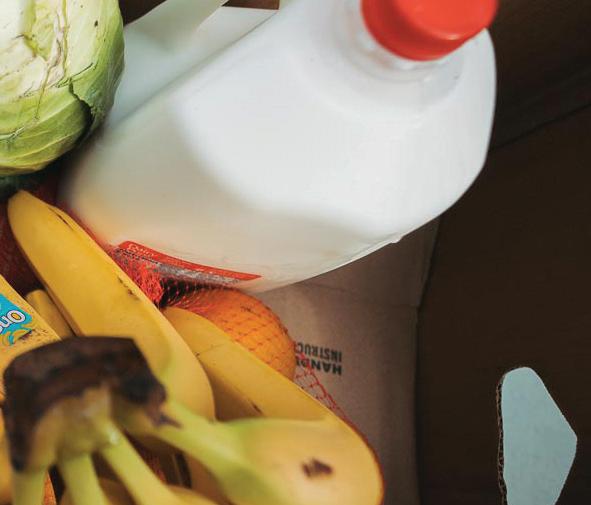
“People right now are stumped, they’re dealing with layoffs and other difficulties. They may be down to their last check and may be thinking ‘I need some hope, this is my last check’ and then a Hope Note comes and gives them encouragement—that check for $700 may seem like it’s $7,000 in that moment.”
-XZAVIER CURRY EBENEZER BAPTIST CHURCH
NFL’S PIERRE DESIR GIVES BACK

Winston Churchill famously said,
And Pierre Desir, NFL Cornerback for the New York Jets, said this is a quote he tries to live by.
“We make a living by what we get, but we make a life by what we give.”
“For me, giving back to the community is very important. It allows us to show them that we care…that we’re here for them,” Desir said. “Samaritan’s Feet is an organization that not only provides shoes to people in need, but it supplies hope and a sense of confidence for the children.”
Desir wanted to take part in giving that hope to children, so he partnered with Samaritan’s Feet to sponsor shoe distributions for around 1,500 children in Indianapolis, IN, Jennings, MO, and Newark, NJ—all cities that have been his home at one point in his life.
In Indianapolis, students at Brookside Elementary received a special treat just before Christmas break in 2019. Smiles, laughs, and high fives were seen all around the room as children received their new shoes.
“Most of us are so fortunate to be able to walk into a store and buy a pair of shoes and buy a pair of socks. Some of these kids don’t have that luxury to do so. For me, being in the position that I am in, I feel that it’s my duty to give back,” Desir said.
Just a month later, in January 2020, Desir hosted an event in Jennings as part of Samaritan’s Feet’s National Day of Service campaign. 500 students at Northview Elementary received new shoes and socks and a very special memory.
“Our district is considered 100 percent free and reduced lunch,” Patricia Guyton, Principal, Northview Elementary, said. “To give them shoes? My goodness. We have some students come to school with shoes that are too big or too small. This will be something they always remember.”
At this event, Desir was joined by St. Louis County police school resource officer Marshall Lee who sat down and served the students he interacts with every day. Other volunteers commented how special this time serving was, saying it warmed their hearts just to see the smiles and excitement from the children.
“Every time I do one of these events and give a pair of shoes, you see the excitement and you see how empowering it is to get that connection with the kids. For me, it’s a blessing,” Desir said.
Just a few months later, during the peak of COVID-19 in the U.S., Desir decided he still had the opportunity to make a difference despite restrictions. Desir became a 2020 Hope Giver for Samaritan’s Feet, committing to raising awareness and funds for the mission of the organization: creating a world with zero shoeless children.
But Desir isn’t done yet. Towards the end of 2020, Desir will help distribute 500 pairs of shoes to families in need across the Newark area.
Desir has used his own life as an inspiration to give back. Desir was born in Port-au-Prince, Haiti and immigrated with his family to St. Louis when he was four years old as they sought to leave unrest and violence in Haiti. In the 2014 NFL Draft, he was picked by the Cleveland Browns and in 2019, Desir was nominated by the Indianapolis Colts for the Walter Payton NFL Man of the Year, recognizing him for his service in the community.
Desir said, “I knew for me, I was always trying to find a way to give back and inspire hope. And I will continue to give back in whatever way I can.”

CORNERBACK
VOLUNTEER
-PIERRE DESIR NFL
2020 HOPE GIVER

THE GOAL. 1,000,000 THE REASON. EVERY ONE MATTERS HOW? PEOPLE LIKE YOU BECOME A RECCURING DONOR TODAY www.SamaritansFeet.org/Give
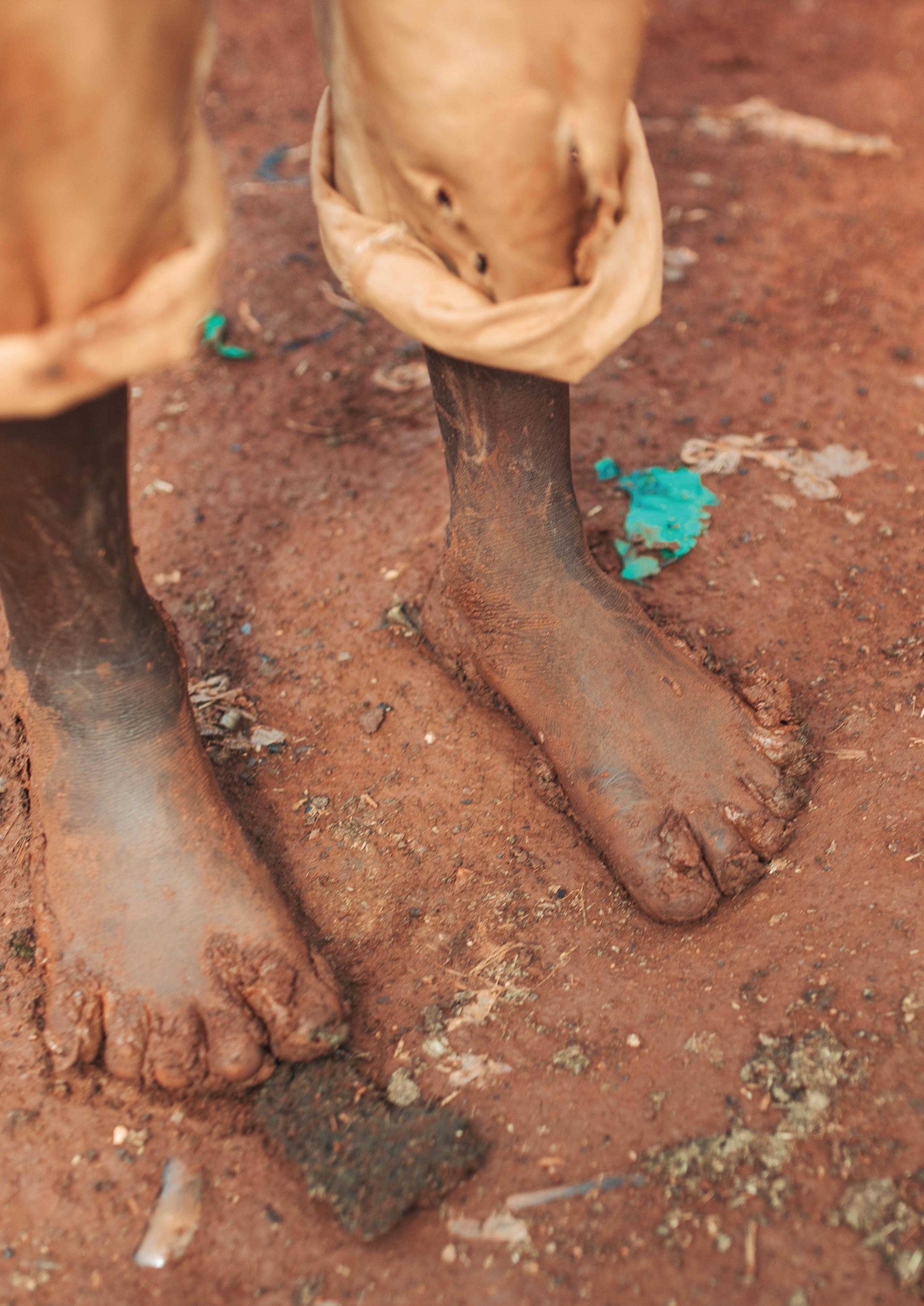
JOINING THE FAMILY IN APPALACHIA
Small towns are like big families.

And the Samaritan’s Feet mission team serving throughout McDowell County, West Virginia instantly saw this in action.
As the caravan of trucks made their way down the winding, wet mountain roads, the team arrived at their first distribution in Northfork, West Virginia. The hard morning rain didn’t stop people from walking and driving up to get their new shoes.
The team met Ms. Renee, who was so overjoyed with her new shoes, that she came back multiple times with neighbors, friends, and family so that they could share in the joy. Ms. Renee didn’t have a vehicle and walked up to the distribution site all those times saying, “It’s just good to have something comfy on your feet.”
Next, the team met a father who had the shoe sizes of his children saying he couldn’t “Wait to put these shoes on their beds when they got home from school.” And although the team didn’t see the reactions of those children, what a wonderful moment for his family: the dad gets to be the hero as he gives this special treat to his kids.
And then the team met Ms. Yolanda, who takes care of her elderly mother in Northfork, who said, “Thank you so much for thinking of us. It’s so poor here and this is so nice for us.”
What is surprising, however, is that Northfork and the surrounding towns in the county weren’t always poor. McDowell County was a desirable destination and was once the “largest coal-producing county in the United States” with 100,000 people residing there in 1950 (Charleston Gazette-Mail, 2013).
Mr. Donald, a long-time resident of McDowell County, resides in the same coal miners house that he grew up in. He only recently got electricity and running water in his home. Despite these conditions, he speaks with enthusiastic optimism about his home, town, and community. His big smile and gracious attitude are contagious.
But today, 33.3% of the population in McDowell County lives below the poverty line—nearly double the rate of West Virginia overall (U.S. Census Bureau, 2018).
“Graphs and tables can hardly relate the acutely personal story of a child in a remote valley, his horizon of opportunity limited to the enclosing hills; nor the despair of his father, who, idled by forces beyond his control and seeing no prospect of future employment, must live month in and month out with the vision of that child repeating his own history…”
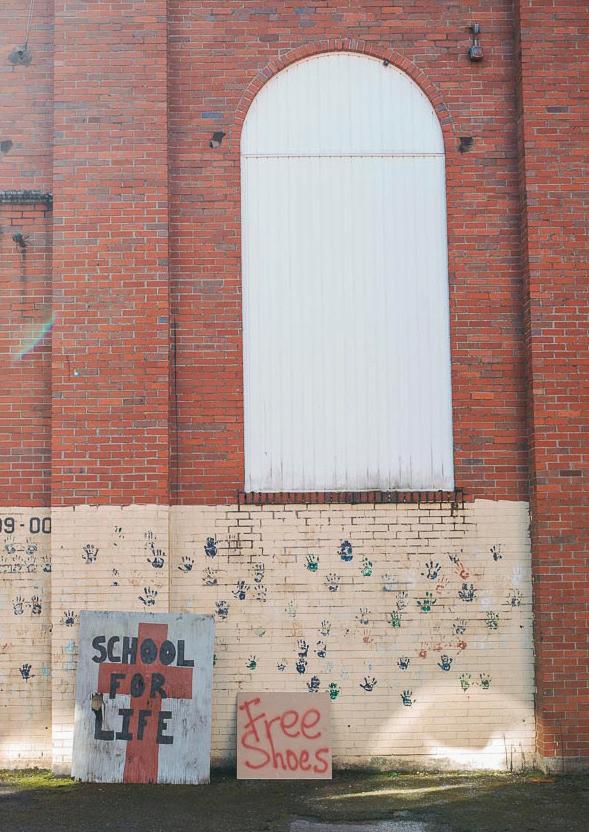 Appalachia: A Report By the President’s Appalachian Regional Commission, 1964.
Appalachia: A Report By the President’s Appalachian Regional Commission, 1964.
Upon telling the team his story, he sweetly told us, “You have to have hope to cope.”
Most times, hope is considered a prompt that pushes people to go beyond their “normal,” to pursue big dreams and make big changes. But here in McDowell County, Mr. Donald tells us that it may mean something a little different. It may mean you need hope to just manage your daily life in that area.
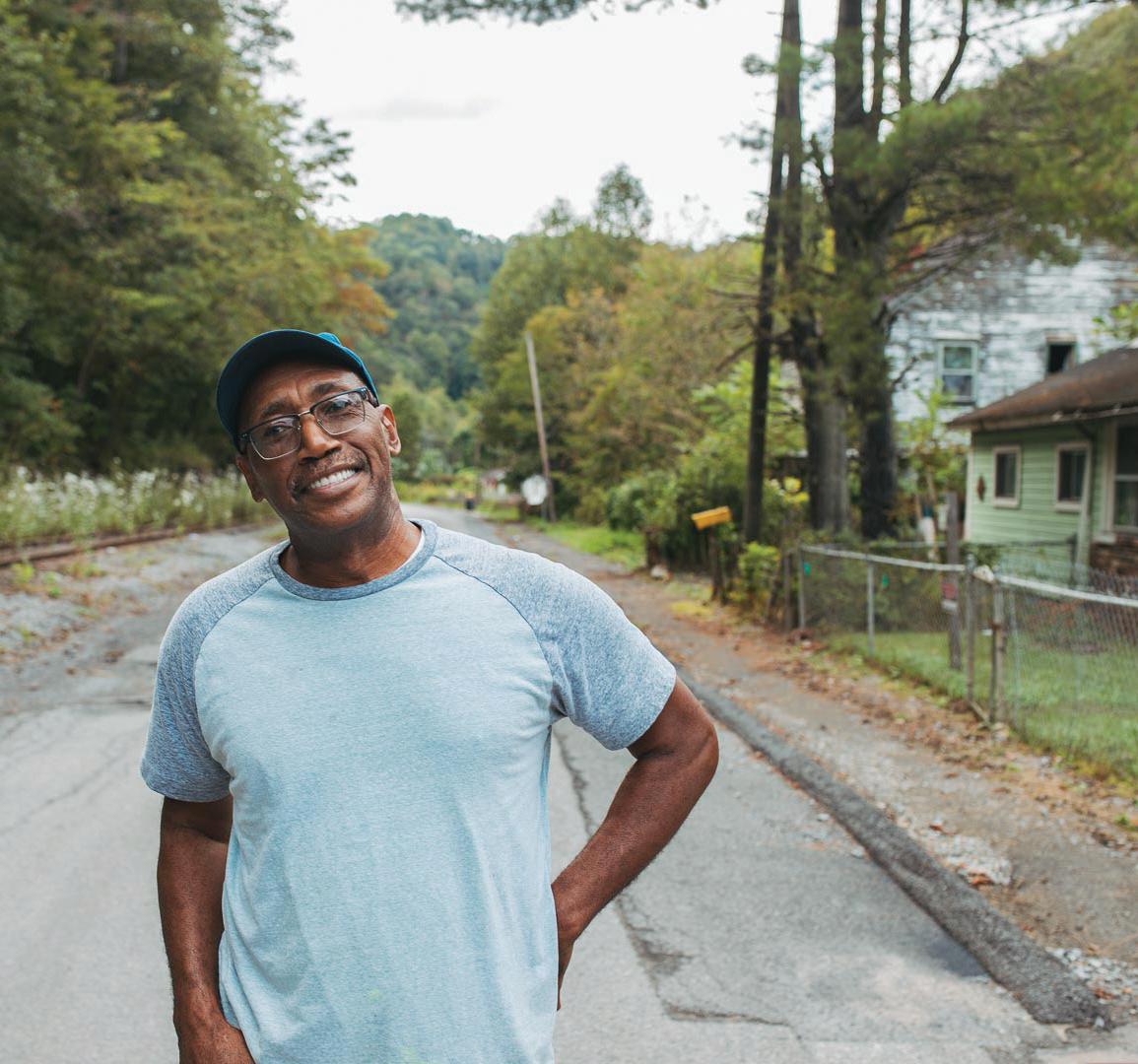
Because life is a little tougher there.
McDowell County is classified as a “food desert” by the U.S. Department of Agriculture, meaning residents live without easy access to fresh, healthy food (Charleston Gazette-Mail, 2018). The team noticed there were no big grocery stores, and also, there were just one or two locations to purchase shoes in the county, which could be over 20 miles away for some residents.
“Graphs and tables can hardly relate the acutely personal story of a child in a remote valley, his horizon of opportunity limited to the enclosing hills; nor the despair of his father, who, idled by forces beyond his control and seeing no prospect of future employment, must live month in and month out with the vision of that child repeating his own history…” (Appalachia: A Report By the President’s Appalachian Regional Commission, 1964).
Mr. Donald noted the importance of speaking hopeful words to children in Appalachia, to promote opportunities, and not limit their dreams, saying, “What you say to a child, they believe.”
So, with each pair of shoes distributed throughout West Virginia, the team also gave a “Hope Note.” These “Hope Notes” included encouraging words which have been submitted from individuals around the world.
Samaritan’s Feet partnered with School for Life, an organization based in Gary, West Virginia that serves the needy in the Appalachia area by changing hopelessness to optimism through the encouragement and guidance for them to be active, creative, contributing members of their communities.
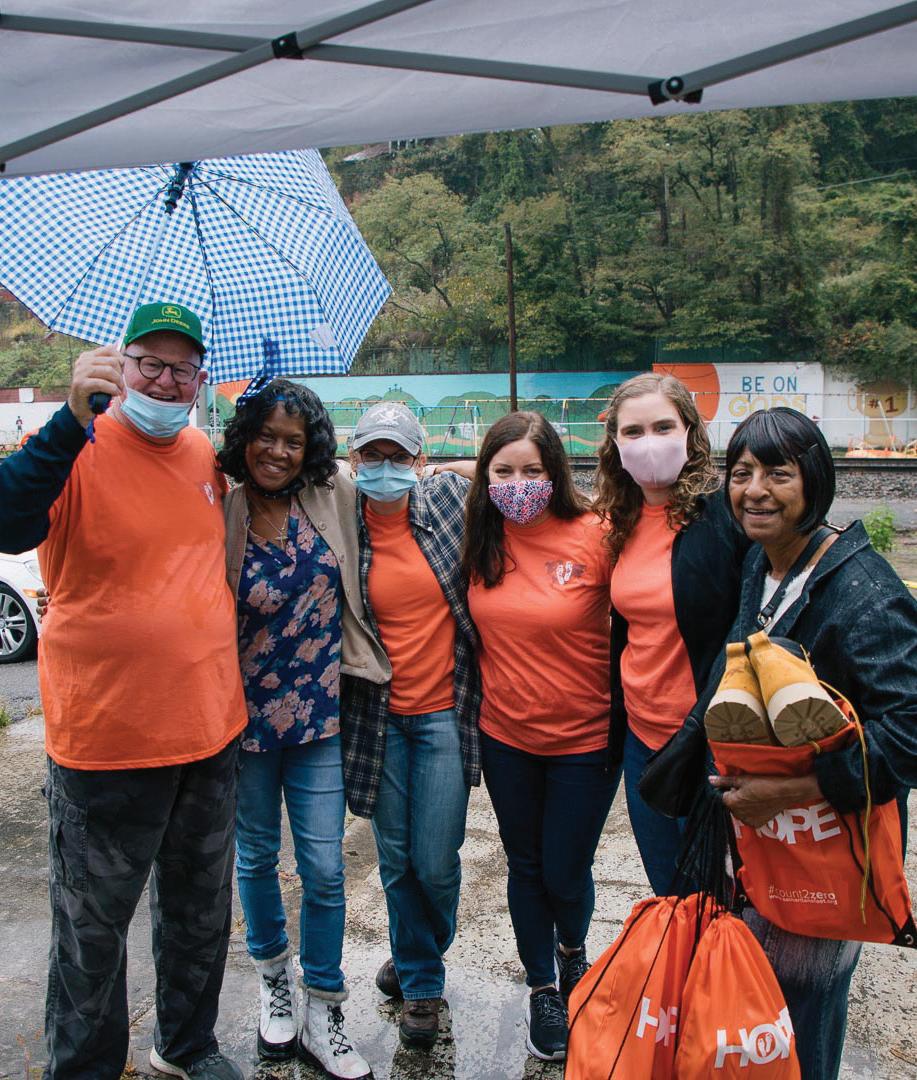
School for Life Director Marjie Moore describes how she saw first-hand the impact words can have on children in this community:
“I met a little girl named Destiny, pretty little blonde-hair blue-eyed girl. She told me one day ‘I’m poor.’ And I told her, ‘no, you’re not.’ She said, ‘momma tells me we’re poor.’ Later, Destiny told her mom about that conversation and her mom called me. I told that mom, ‘you are not poor. You may live in a situation without a lot of money, but when you tell her you’re poor, she’s going to believe it. Let her grow up, have a life, and then she can decide if she’s poor or not.’ And when I told Destiny that too, it was like a whole light came upon her face. Because if someone tells you you’re stupid all the time, what are you going to believe? What comes out your mouth is more powerful than anything that you can do. Because it’s lasting.”
Moore was living not too far away from the Appalachia area in Virginia, but was unaware of the needs just across state lines.
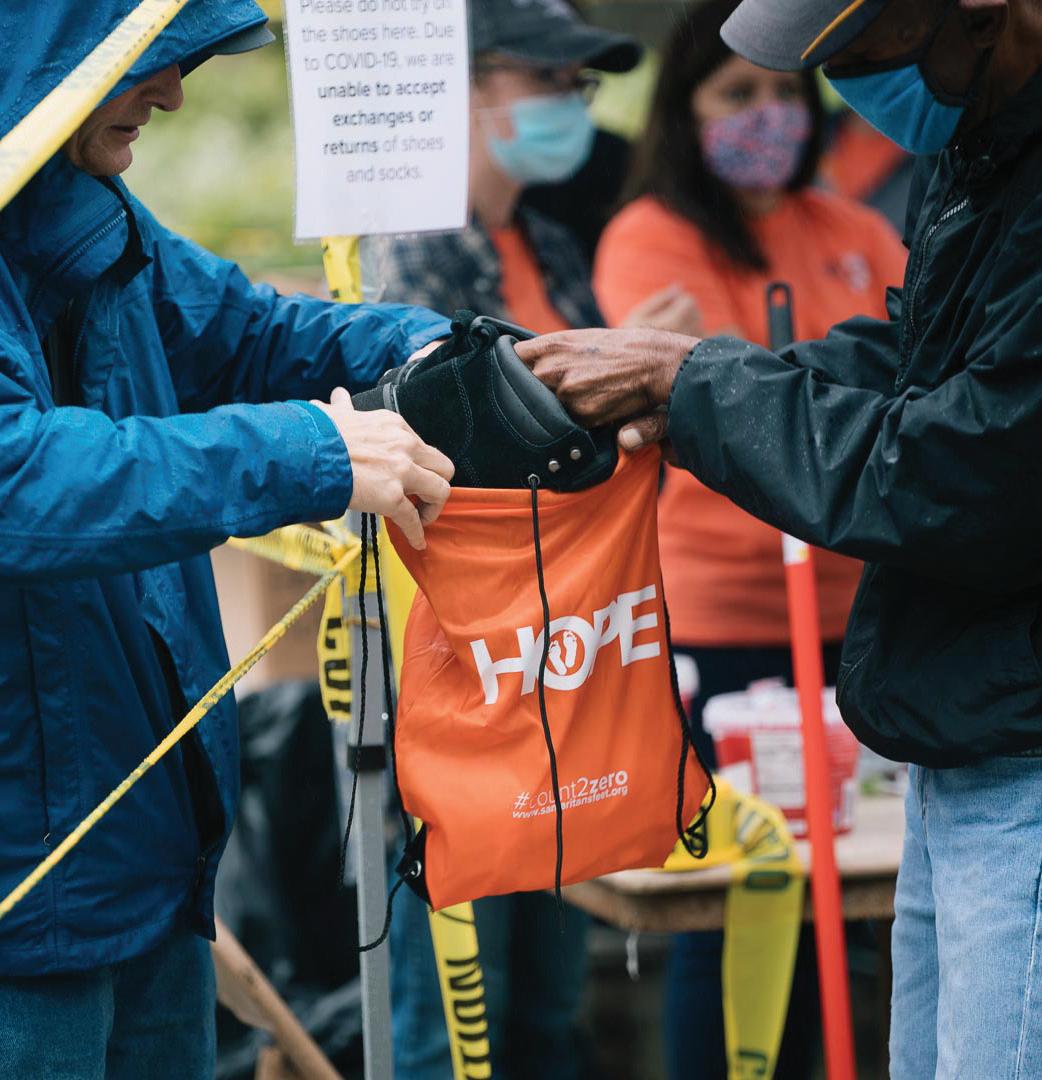
“I own a restaurant in my hometown in Virginia. A gentleman came in and explained to me that he was going on a mission trip. I asked what country and he said he was going to Appalachia in West Virginia. I remember saying to him, ‘why would you go there?’ And he said, ‘because it’s a very impoverished area.’ This was total news to me.”
After a trip down to Gary to see the needs for herself, she decided to stay.
“Curiosity brought me here, and these kids kept me here. These kids here think no one cares about them,” Moore said.
As the team served in nearby Iaeger next, a child in the backseat of a car said, “Are these mine? There are socks in there, too!” after receiving his bag with new shoes.
And although it was again a rainy morning, it again didn’t stop families from coming to get new shoes. In fact, the estimated population of Iaeger is 230 people. Samaritan’s Feet distributed approximately 150 pairs of shoes. 65% of the town got new shoes in one day.
These moments are special. Because right there, in that moment, this man’s daily life drastically changed. He doesn’t have to be in pain when he walks. He can be proud of himself as he travels and works around town.

As each car approached the Samaritan’s Feet tent, the team cheered in excitement to serve and have conversations with those who received shoes. As we gathered sizes from the drivers, the team had the opportunity to get to know them, what they did for work, have they always lived here, and about their families. After chatting with one gentleman about his frequent hunts in the area, he came back later and brought some pictures.
The team was now a part of the family.
Many who were driving up came with a list of sizes so that their neighbors and friends, who didn’t have cars, could also receive shoes. One individual let us know that he was picking up shoes for his 80-year-old neighbor, who didn’t have any shoes at all.
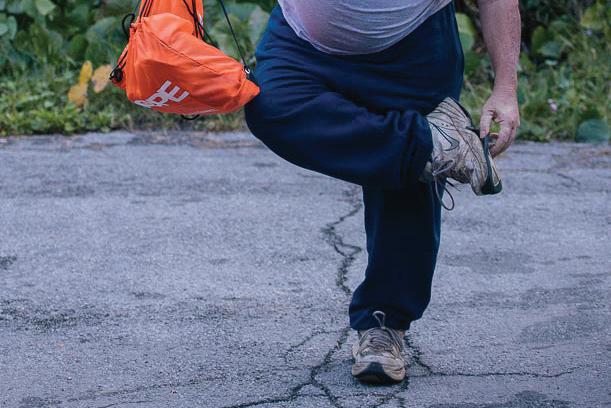
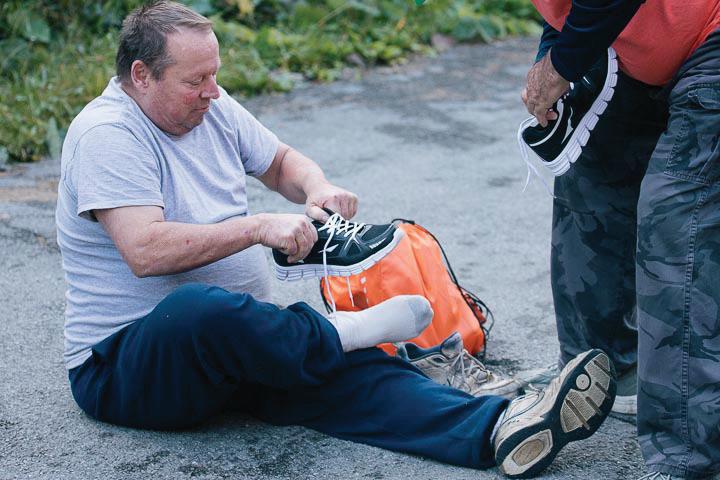
Tara Fisher decided to go on the mission trip to Appalachia after hearing a similar story about not having shoes from her co-worker at Lineberger Orthodontics: “She told us about growing up in Mexico and her parents would go to work in the United States. While they were working there, they would send shoes back home. Oftentimes they wouldn’t fit, but she had to make them work. After hearing that story, I realized there are so many people who don’t have shoes. And I wanted to go on this trip to help.”
The last shoe distribution was in Gary. The sun was finally shining and the team was excited to serve in the place that had been home for them the past several days.
One of the first people to walk up to the distribution impacted everyone.
“A man walked down the steep hill to our distribution in Gary. He had a big smile on his face, a sweet toothless grin. He had on a pair of shoes that he had been wearing for over 10 years. It was his only pair of shoes,” Fisher said.
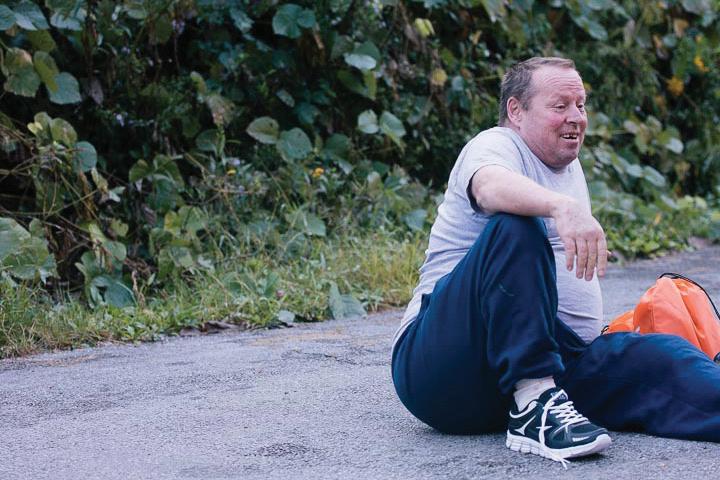
The team got his shoe size and handed him his brand new pair of shoes. The man then sat on the ground to show just how much these new shoes meant to him. He pulled off his old ones and showed them to everyone—they were falling apart and the soles were peeling completely off, almost nonexistent.
These moments are special. Because right there, in that moment, this man’s daily life drastically changed. He doesn’t have to be in pain when he walks. He can be proud of himself as he travels and works around town.
It was a moment that was expected, yet unexpected. And those types of moments are unforgettable
WANT TO EXPERIENCE MOMENTS LIKE THIS? LEARN HOW AT: WWW.SAMARITANSFEET.ORG/GO
H N O O P T E E S
In a world full of fear and uncertainty right now, it’s important to pause and count your blessings. Although we’ve been impacted here at Samaritan’s Feet, the story of hope never stops. Samaritan’s Feet believes in inspiring hope and now is our time to do just that. We have the chance to use our voice and give hope and love at a time when the world needs it most. Children may outgrow their shoes, but they will never outgrow the messages you leave with them.
SEND YOUR HOPE NOTES AT: WWW.SAMARITANSFEET.ORG/HOPE
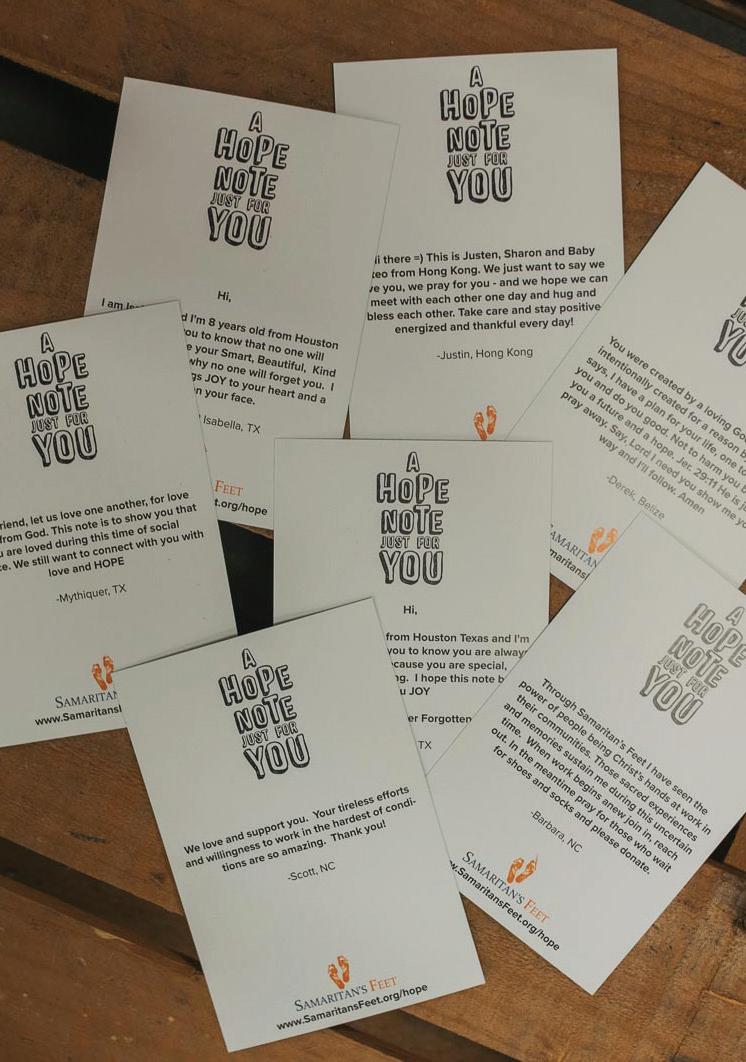
HOPE


GIVERS
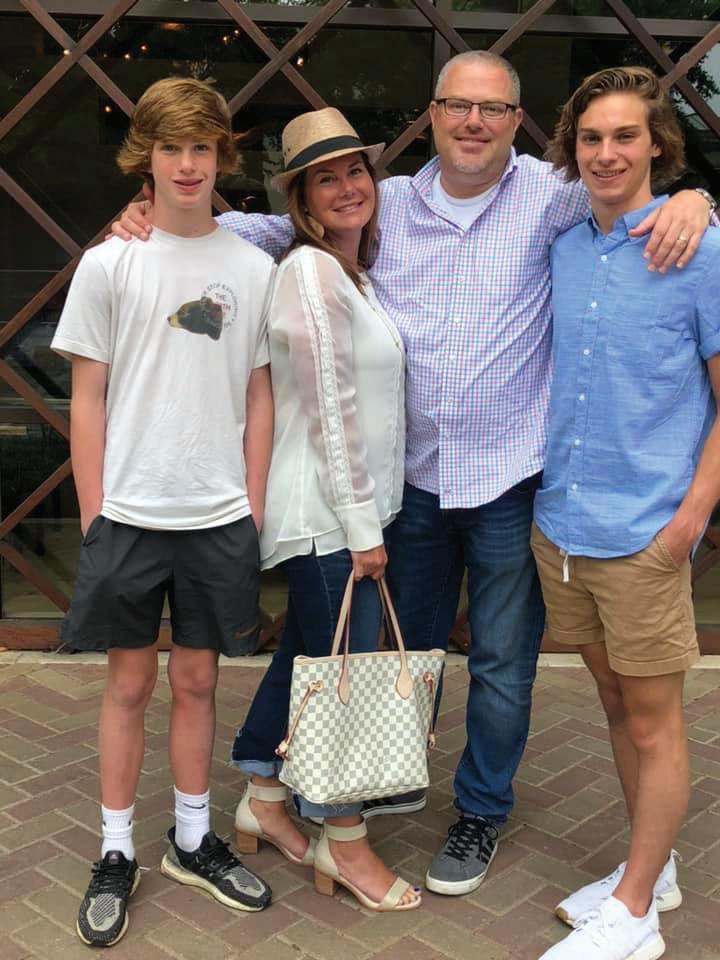

Thank you to our amazing group of 2020 Hope Givers. At Samaritan’s Feet, HOPE represents Health, Opportunity, Peace, and Education. The Hope Givers platform empowers individuals to serve, give back, and positively impact children’s lives. Together, our 2020 Hope Givers from around the country raised tens of thousands of dollars which will help provide new shoes and a message of hope to children in need.


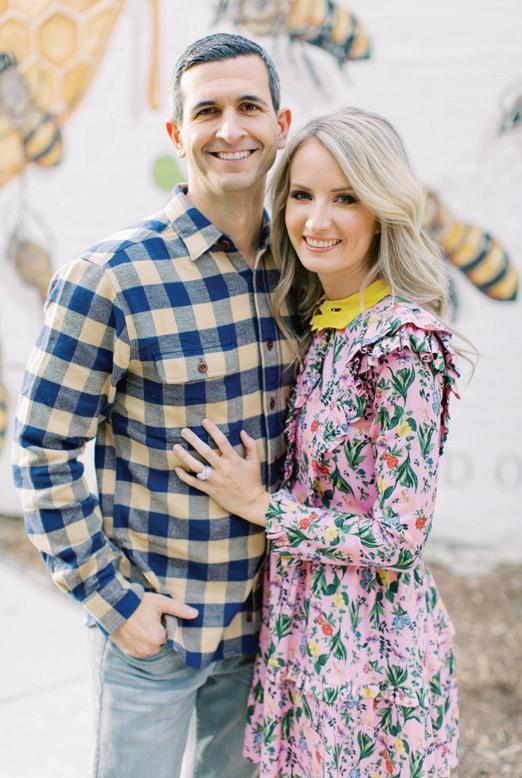
To find out more about Hope Givers and how you can become one visit www.SamaritansFeet.org/HopeGivers

 DR. OBINNA & NGOZI ORIAKU KEVIN & LEANN EGOLF
RYAN & KATRINA HUTCHINS
DR. MATT & DR. MEG LINEBERGER
DR. KENNY & FEMI TOKUNBOH
CHELSEA BELCHER
PIERRE DESIR MICHAEL BROUSE
DR. OBINNA & NGOZI ORIAKU KEVIN & LEANN EGOLF
RYAN & KATRINA HUTCHINS
DR. MATT & DR. MEG LINEBERGER
DR. KENNY & FEMI TOKUNBOH
CHELSEA BELCHER
PIERRE DESIR MICHAEL BROUSE

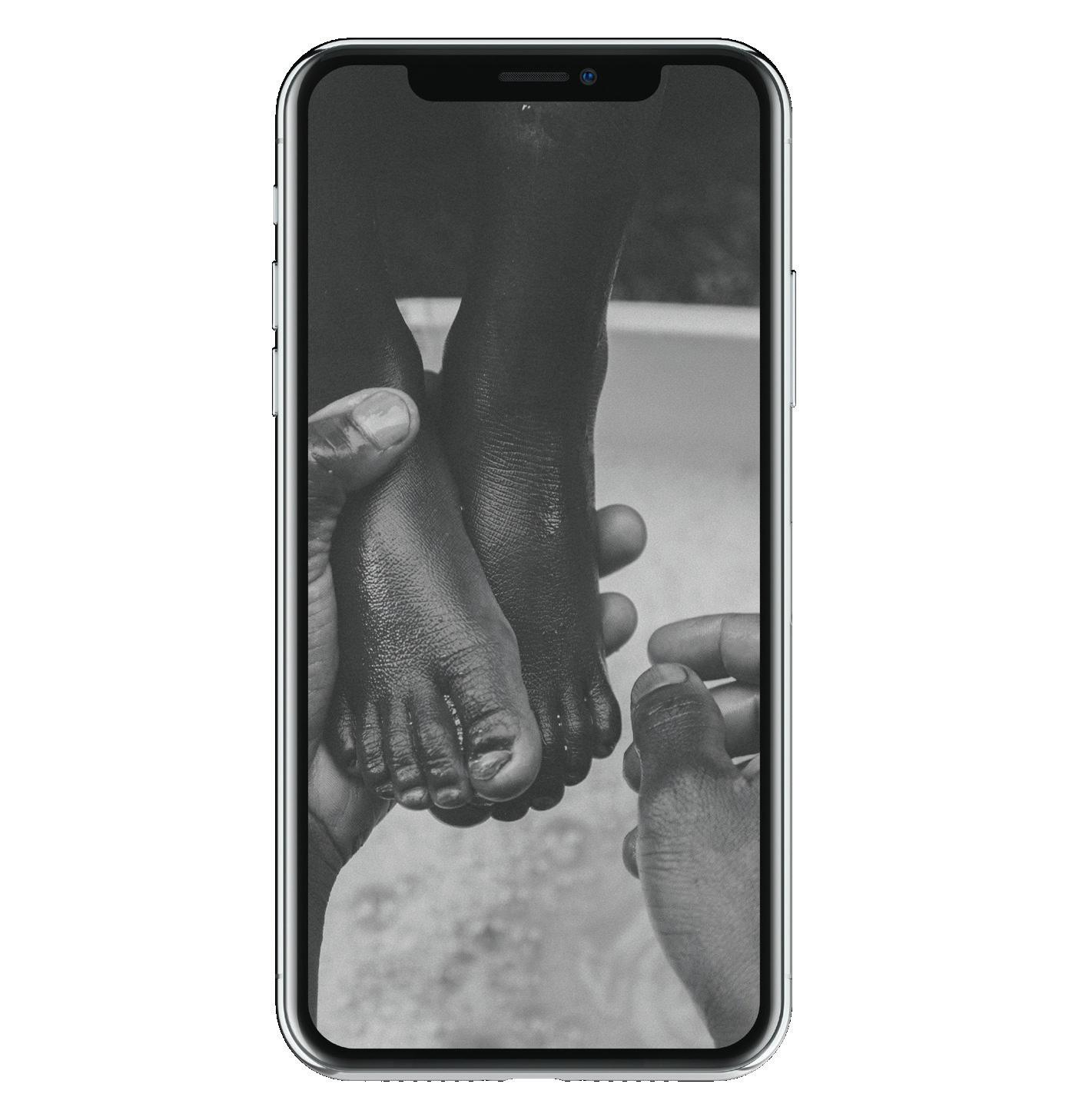
www.SamaritansFeet.org/SoleSociety
You’re going to change lives. You’re going to be connected. You’re going to be encouraged.
Throughout January and February of 2020, before COVID-19 began hitting the U.S., Samaritan’s Feet served over 10,000 individuals and mobilized over 1,200 volunteers at events across the country, all in honor of Dr. Martin Luther King, Jr. and his commitment to creating a “Beloved Community.”
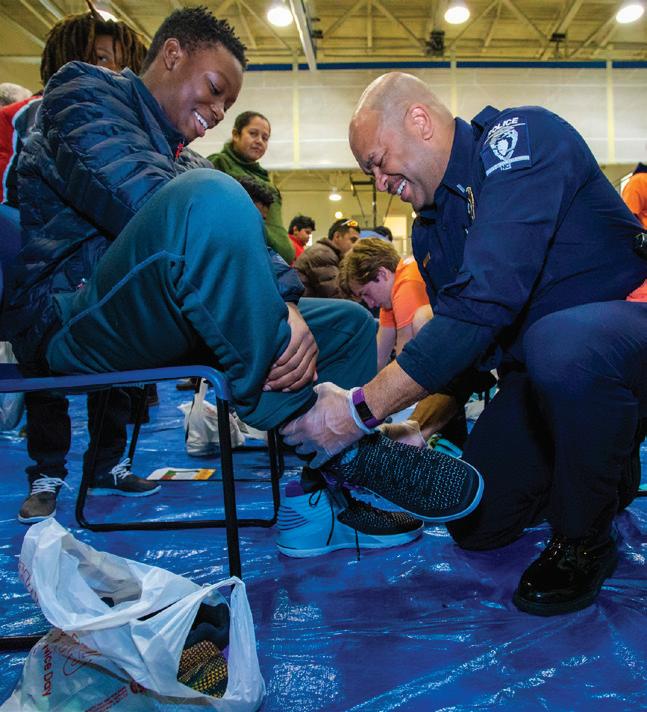


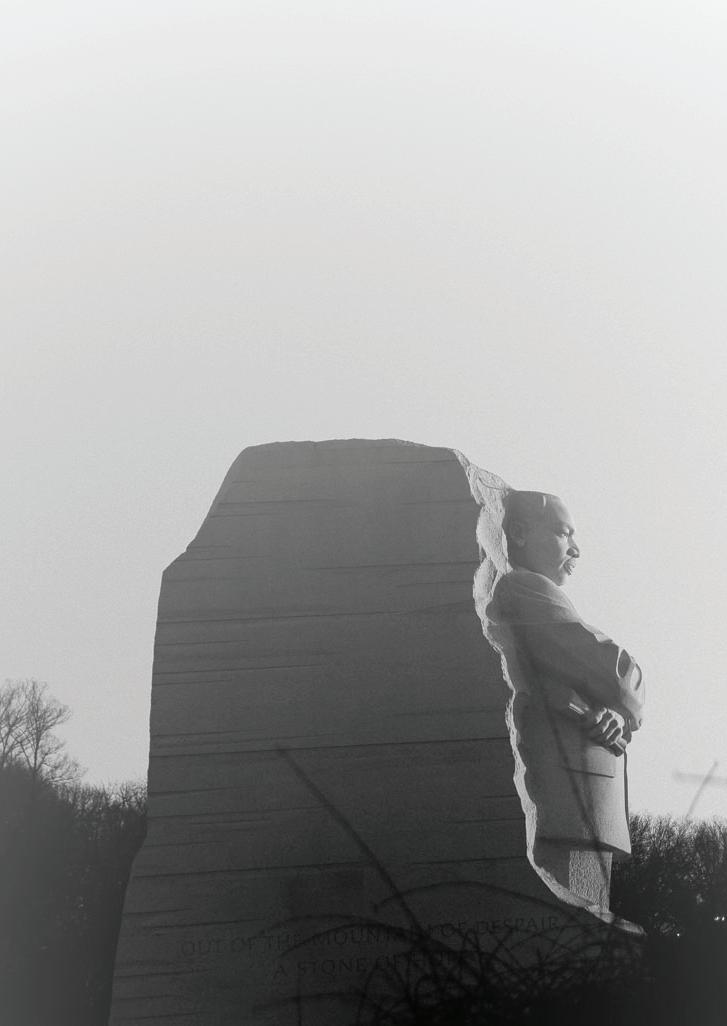
These events were made possible through a grant from the Corporation for National and Community Service, a federal agency that encourages volunteerism and coordinates national service initiatives.

As we spent time serving these children with new shoes, we asked them about their dreams, hopes, and aspirations, encouraging them to believe in themselves. Check out what our partners and volunteers had to say about the impact of these events and time together.
“I really love Samaritan’s Feet and what it does to encourage these kids and help these parents. I was so blessed to see how excited and full of joy the children get when they receive their new pair of shoes and socks. This is a unique opportunity to give of yourself and give to others.”
Fenee Murdock, Volunteer North Little Rock, AR

“I think shoes are important for everyone. Our school is located in a neighborhood that’s one of the lowest income areas in D.C., so providing sneakers to families is really a way of leveling the playing field for all kids.”
Sundai Riggens, Principal Washington D.C.
“This event has been so amazing. [Our students] are learning about empathy, learning about hope, learning about caring so that in the future, they’ll be able to give to somebody else.”
Susie Towber, Principal McKinney, TX MAKE


“This is a school I went to when I was a kid, so it makes me feel really good to come back home with something so beautiful. It puts things in perspective. It lets you know how fortunate you are because some of these children have never had a pair of new shoes.”
Desmond Echoles, Volunteer Jackson, TN

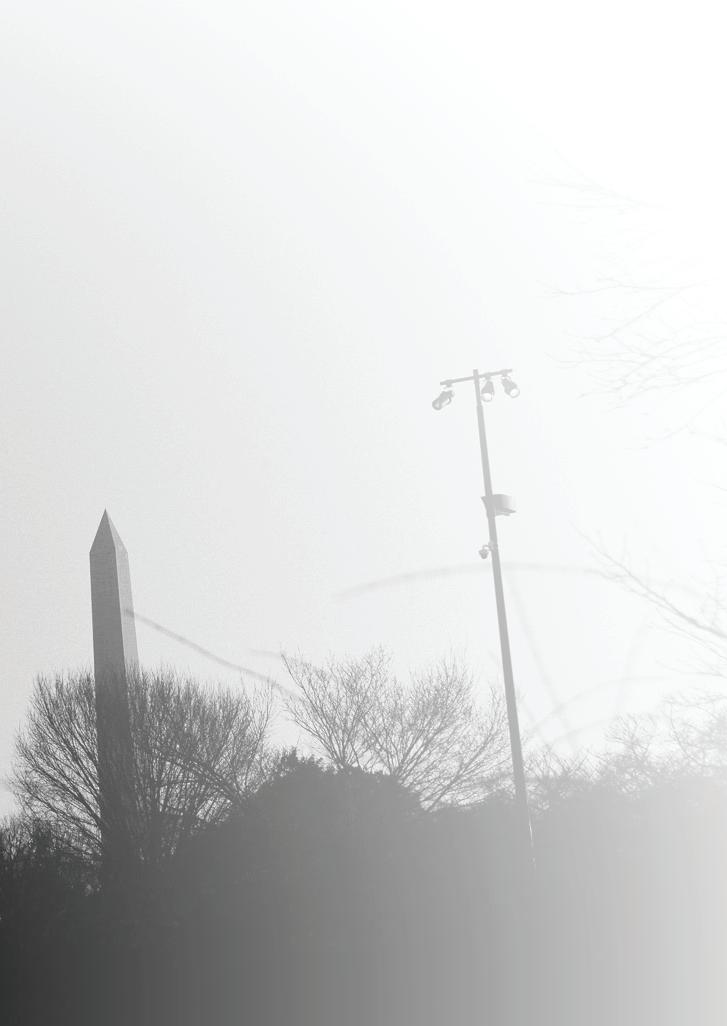
“There was a little kid next to me who had the brightest smile on his face and the conversation he was having with the volunteer serving him just made me realize this is so worthwhile and meaningful on so many levels.”
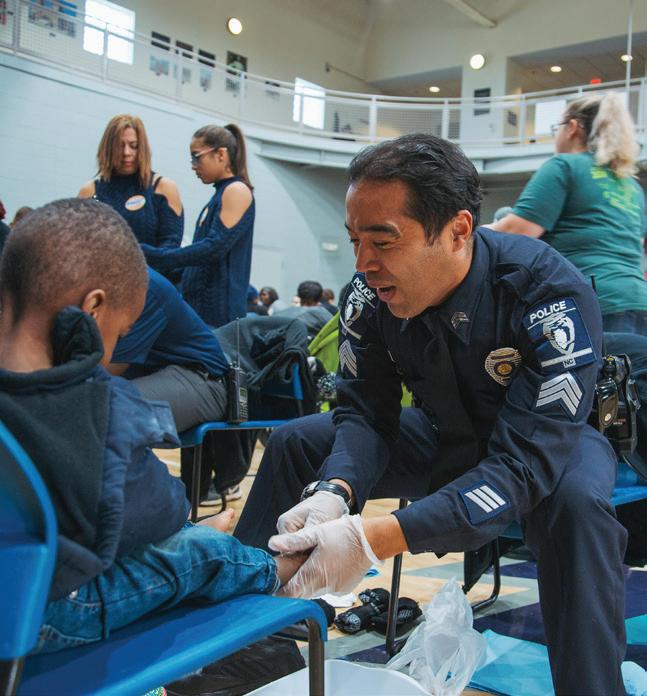
Blondelle Gadsden, Volunteer Charleston, SC

“Shoes gives [these kids] confidence. You know kids, especially some of the ages we see, they’re going through that stage in life where confidence is tough.”
Darren Williams, EKU Baseball Team Member and Volunteer Richmond, KY

PLANS TO SERVE WITH US IN THESE CITIES IN 2021: ATLANTA,
CHICAGO,
COLORADO SPRINGS,
JACKSON,
KANSAS CITY, KS LOUISVILLE, KY MEMPHIS, TN NEW YORK CITY, NY PHILADELPHIA,
LITTLE
AR SIOUX FALLS, SD ST. LOUIS, MO TOLEDO, OH WASHINGTON, DC
GA
IL
CO
MS
PA
ROCK,
DISTANCE MAKES THE HEART GROW FONDER
SERVING ON LOWER BRULE AND CROW CREEK RESERVATIONS IN SOUTH DAKOTA
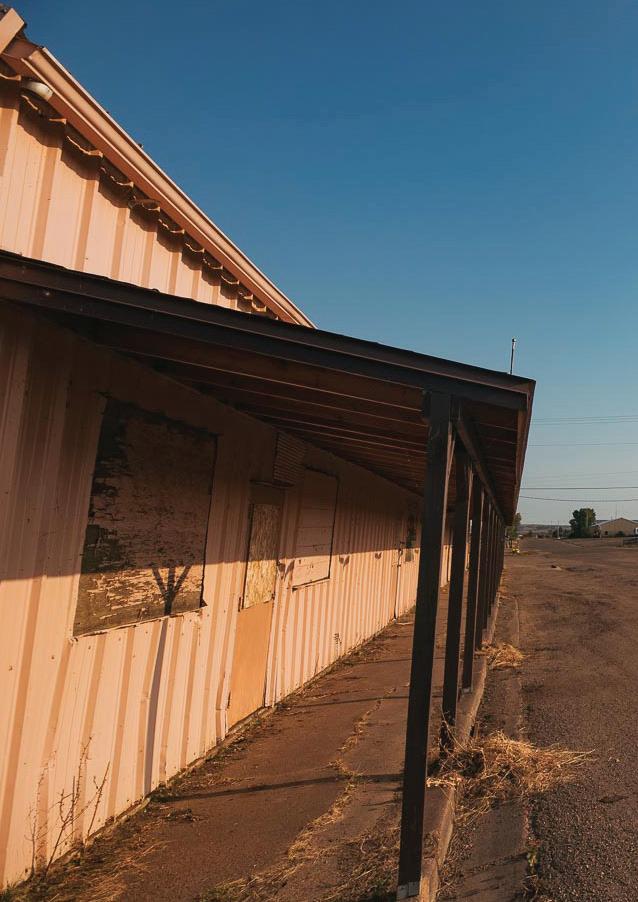
Jeshua Estes, Lakota Teacher at Lower Brule High School in the Lower Brule Reservation added, “We can’t just go to a store five miles away. We have to have a car, gas, and all of these things to get shoes. With Samaritan’s Feet, this is just a really good opportunity to get our students shoes. It makes them feel good and it makes us feel good. I saw a lot of kids happy today.”
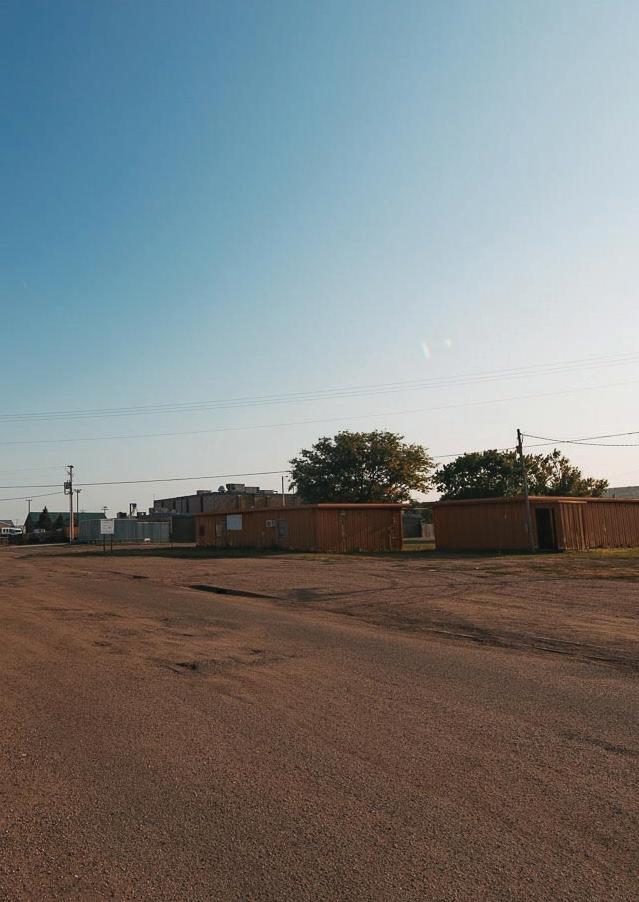
We
60 miles from the nearest place to buy
“
live about
shoes.”
The need was quickly evident as the Samaritan’s Feet team began serving in South Dakota. Throughout the week, the team was educated through statistics and cultural experiences that illustrated the poverty and lack of opportunities in the area. But, at the end of the week, 900 students would have new shoes and smiles so big, they could be seen through a face mask.
Starting at St. Joseph’s Indian School, an American Indian residential school with native children from all over South Dakota, the team did something that’s never been done before: a video shoe distribution.
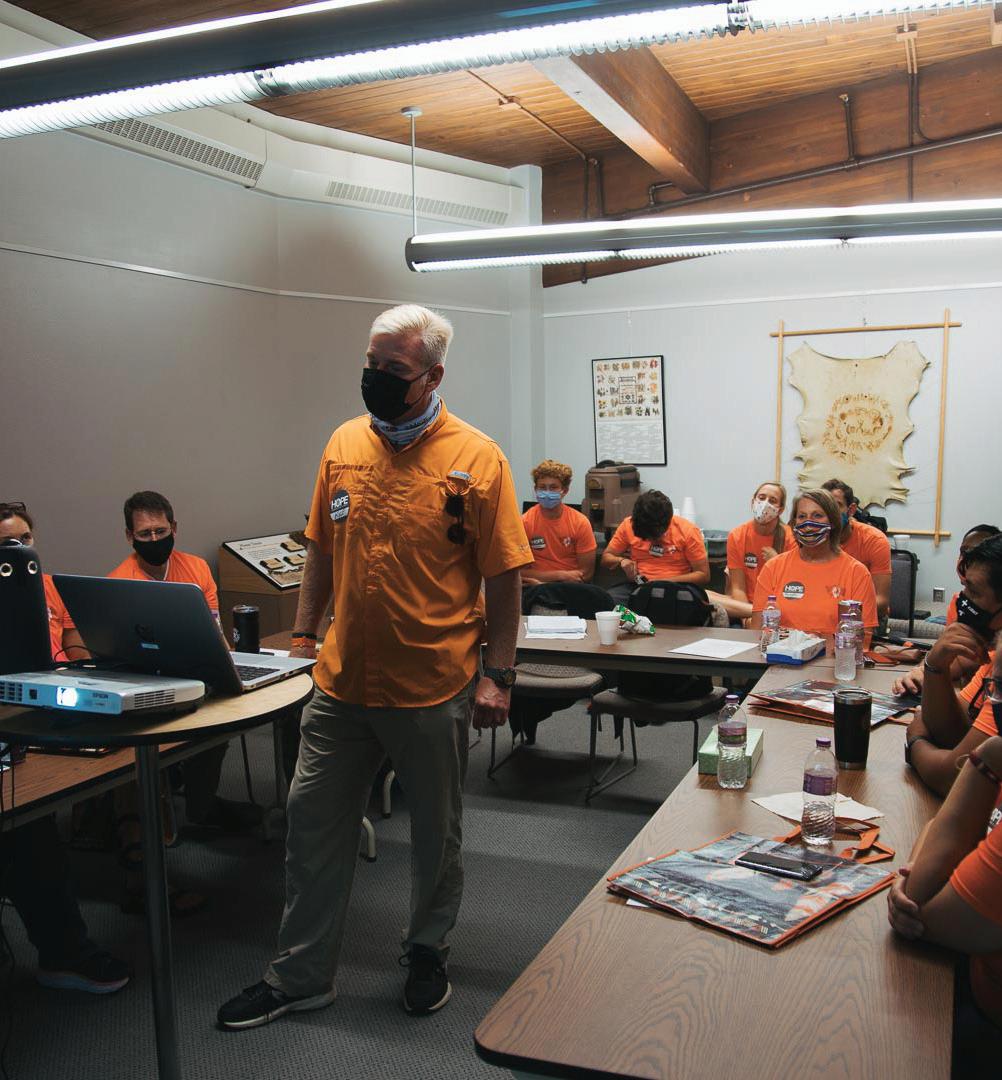
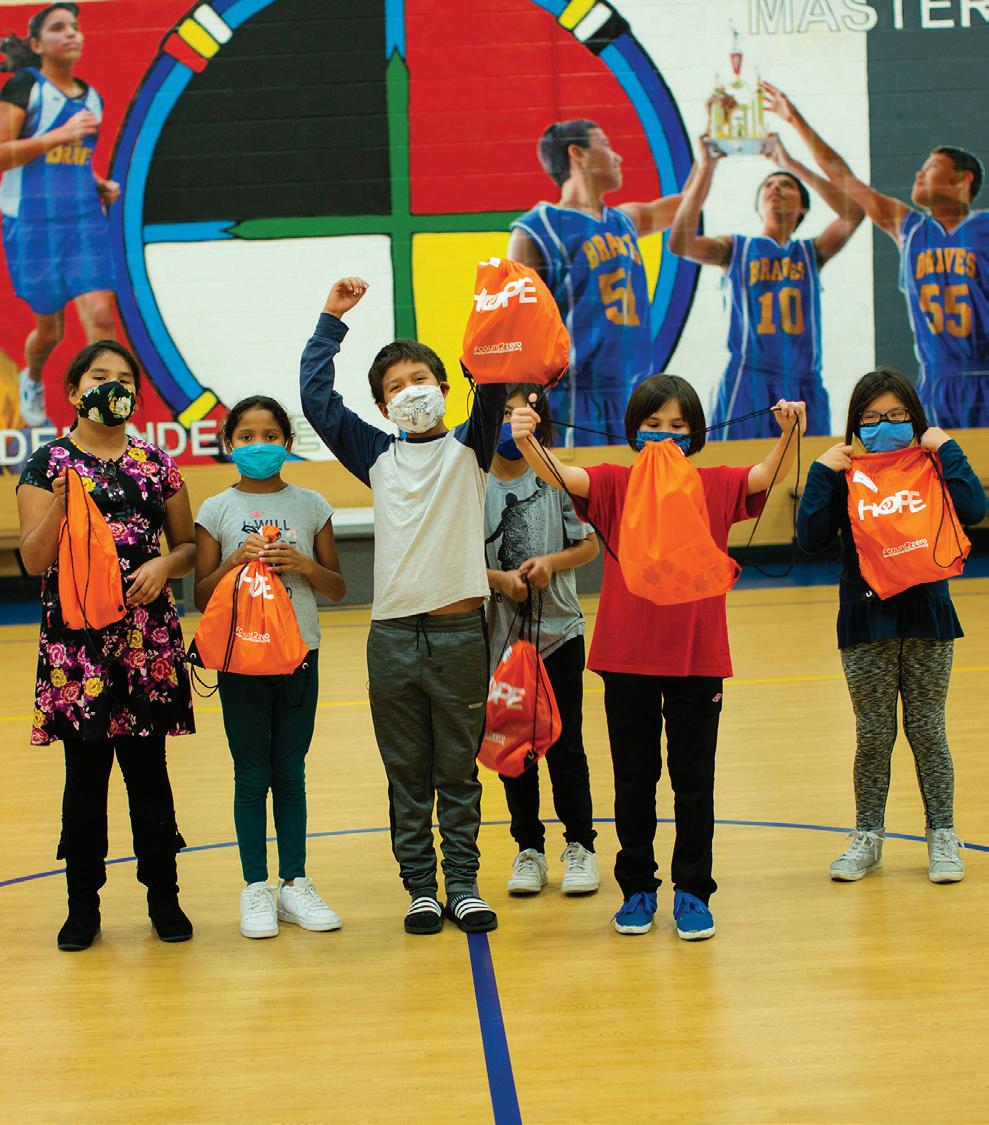
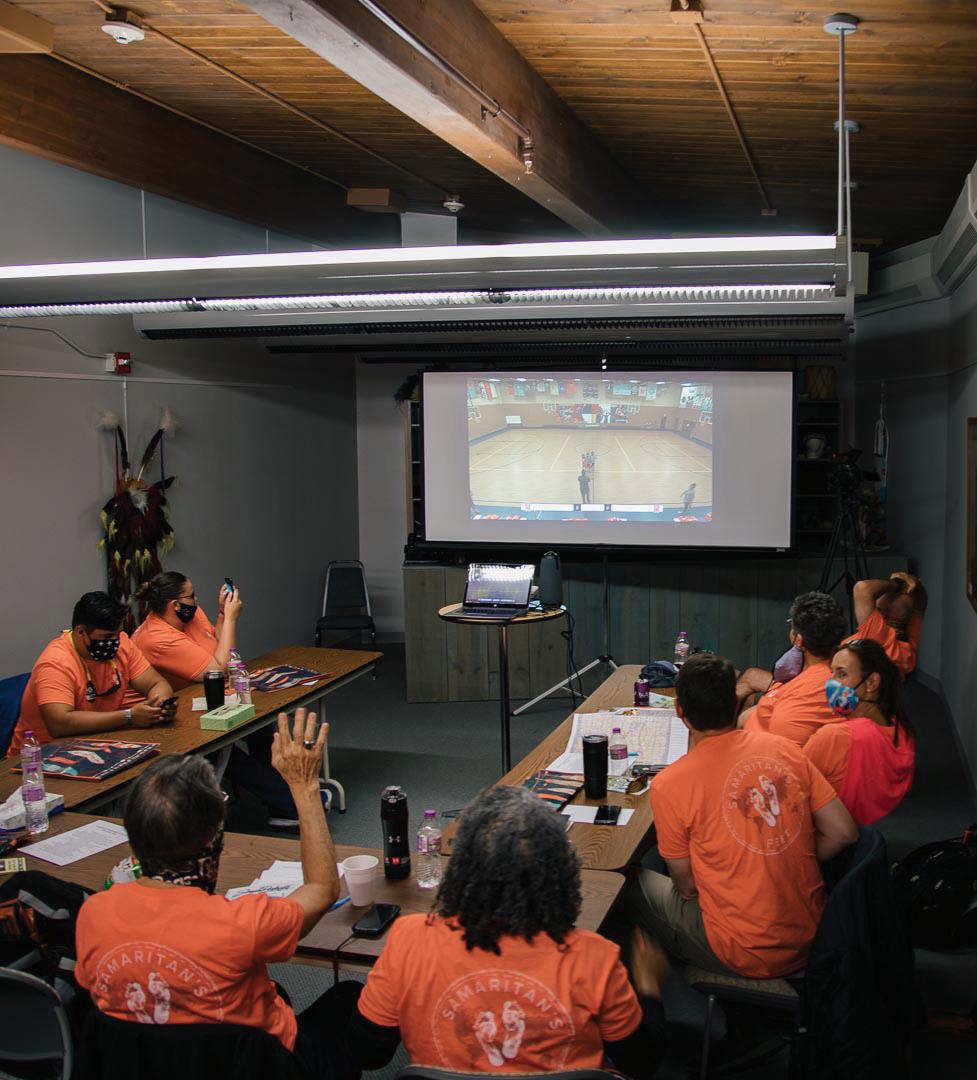
Students arrived at the gym class-by-class to receive their shoes while the Samaritan’s Feet team was in a conference room nearby. With video cameras in both the gym and conference room, the team and students got to interact as the shoes were given out. The students would wave and yell “thank you!” and the Samaritan’s Feet team would tell the students why they were there and encourage them to be the best they can be.
“I grew up in Chamberlain and it’s really important to have shoes in that area. You have to travel quite a ways to even get them. We have a lot of people that walk and that’s their main means of transportation. So if they don’t have a good pair of shoes to wear, it’s really hard on their feet,” Rinehart said.
“I want to just stress how truly important shoes are to our students at St. Joseph’s Indian School. I’ve worked here on campus for 19 years and I’ve seen a lot of struggles with shoes and certain students. Kids go home for the summer and then come back that fall, and their shoes will come back ripped and ragged. They just don’t have the means or resources to get a pair of shoes,” Bryan Rinehart, Athletic Director, St. Joseph’s Indian School, said.
Winter months can be harsh in the Chamberlain area, and many commented that students and individuals there don’t have proper footwear for those snow-filled months.
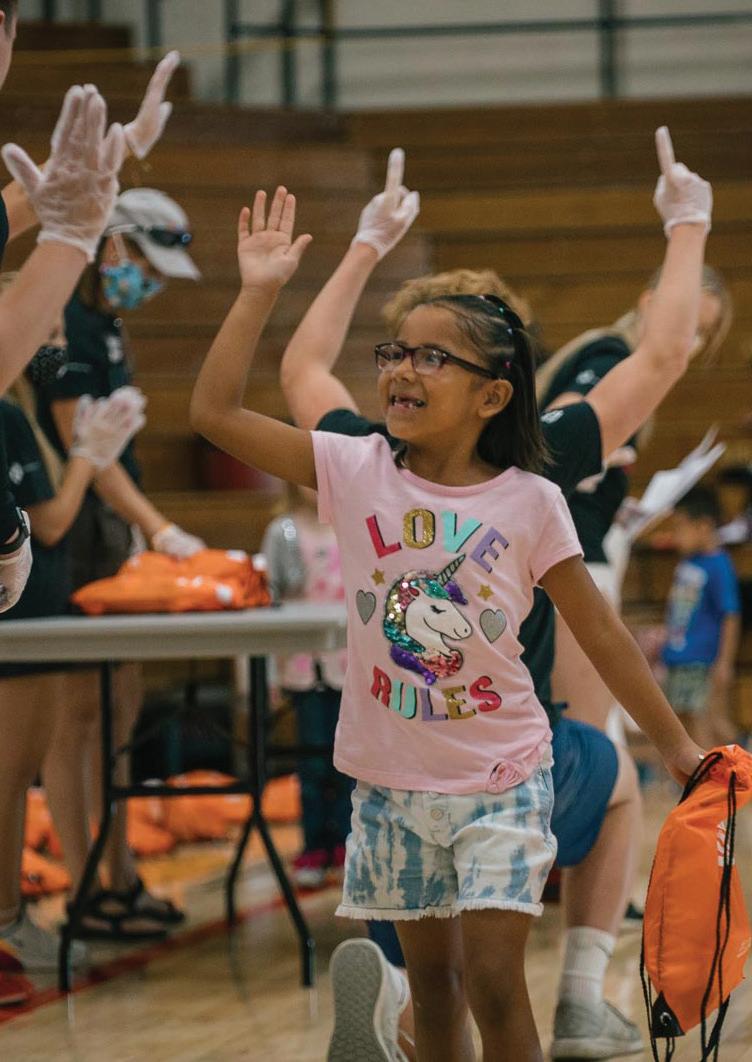
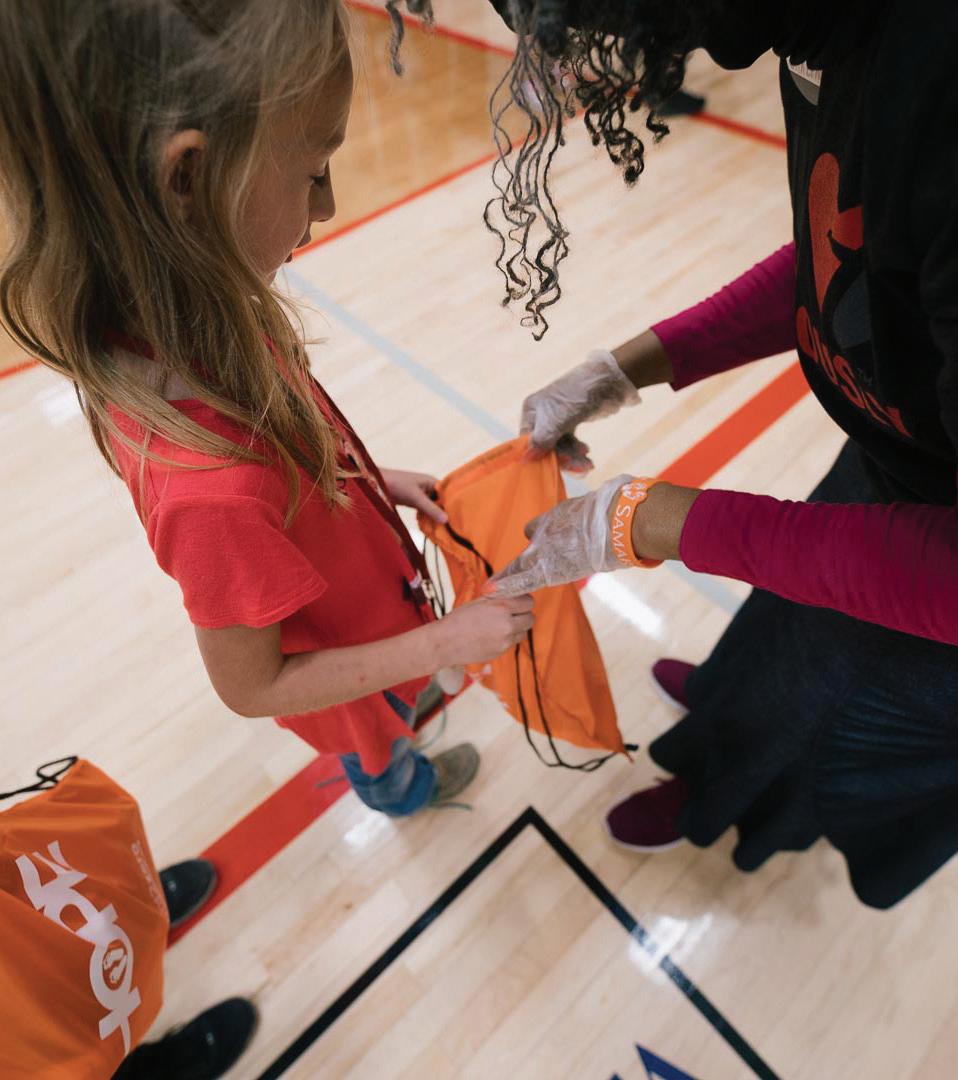
The team continued on in Chamberlain to serve at a local school in town. Entering the gym, the team was met by an energetic and excited group of students. Building on their excitement, Coach Allan Bertram from Sacred Hoops announced to the students, “Today you are getting new shoes because you are great kids and you do great things. Good things happen to people who do good things. Once you get your new shoes on, try to be the best person you can be in them.”
Claps and cheers echoed throughout the gym.
That was soon followed by kids saying, “I got pink!” or “I got purple!”
“These shoes mean so much to our students and their parents, who are going through a hard time right now. It’s been difficult here the last six months or so with COVID-19 layoffs and people not being able to work. So this is just one less thing they have to worry about,” Chantelle Jones, K-6 Secretary, Chamberlain Elementary School, said. She added, “We have quite diverse economic groups in our community. So, for kids that are in the lower economic bracket, it’s really nice for them to have the same kind of shoes as the kids in the upper bracket. When they can wear the same shoes as their peers, it makes everyone feel like they’re on a level playing field.”
A few days after the event at the school, a grandfather of one of the Chamberlain students who received shoes mentioned that his grandson took off his cowboy boots for the first time ever because he was so excited to wear his new sneakers.
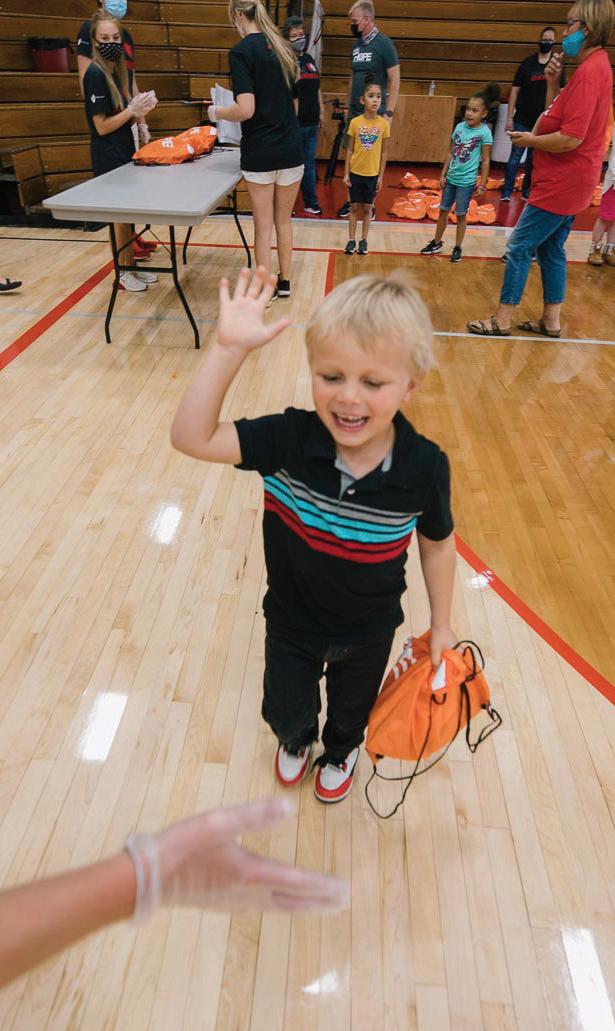
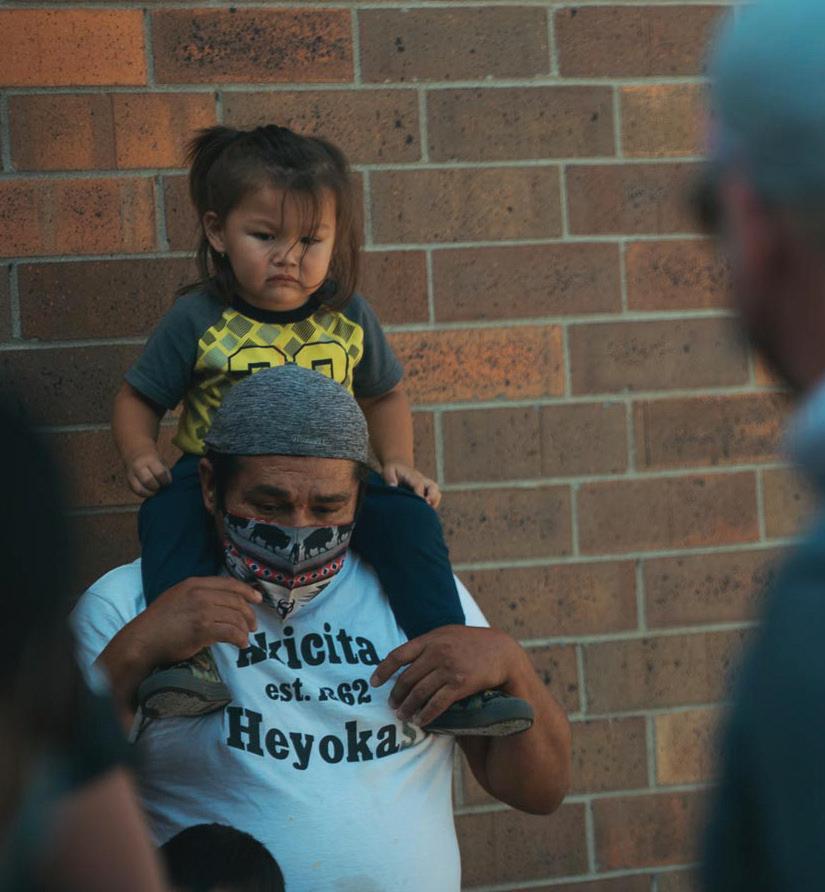
Traveling alongside the Missouri River, the team reached the Lower Brule Reservation tucked away in the beautiful hills of South Dakota. There are 1,800 people registered to live on the reservation, but not many cars were evident. And with the closest store to purchase shoes 60 miles away, the need was great.
Directly across from Lower Brule, on the other side of the Missouri River, the east bank, was Crow Creek Reservation, the site of the next distribution.
“Shoes are so important to our kids in Crow Creek because a lot of them will come [to school] with their toes popping out of their shoes, the wrong size, or the soles are flapping on the shoes. We usually have to get them shoes because they aren’t going to be able to afford it at home,” Brian Sieh, Principal, Crow Creek Elementary, said.
Providing for a need through a pair of shoes is important, but they can mean so much more than that physical piece—they can encourage and empower.
Sieh added, “[When they have new shoes or clothes], students’ self-esteem rises just like that. No fear of getting picked on when they have something new on. It’s one less stress they have to worry about. There are so many stressors on the reservation, and such a hard circle to break.”
An increase in self-esteem prompts a renewed sense of dignity.
“When they feel confident about themselves, and have that structure and foundation of their body strong, it means a lot. That gives them a lot of hope,” Rinehart said.
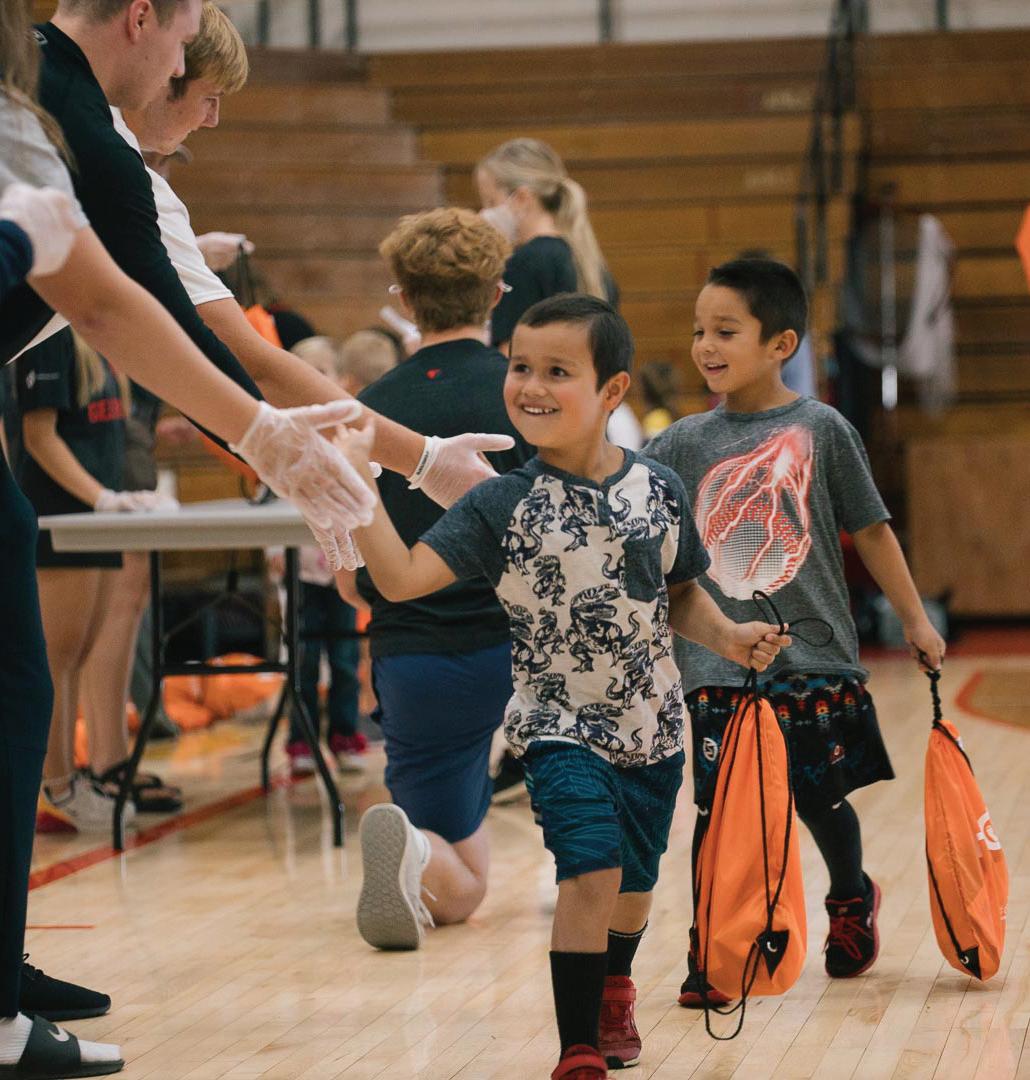
And hope prompts a renewed sense of strength.
Estes summed it up like this, “Like that teepee we put up over there, you have to have good structure and support. If you don’t have that support and structure, it becomes really easy for it to fall, especially when harsh weather comes through. So, you have to have that hope, that support, so that when hard time comes, you don’t fall and you keep going.”
Y O U
C A N
SERVE.
MAKE A DIFFERENCE. CHANGE A LIFE.
Whether you are looking to travel to serve with us or trying to find a way to make a difference at home, we’ve got plenty of ways for you to get involved. Join us and make a lasting impact around the world.
WWW.SAMARITANSFEET.ORG/GO
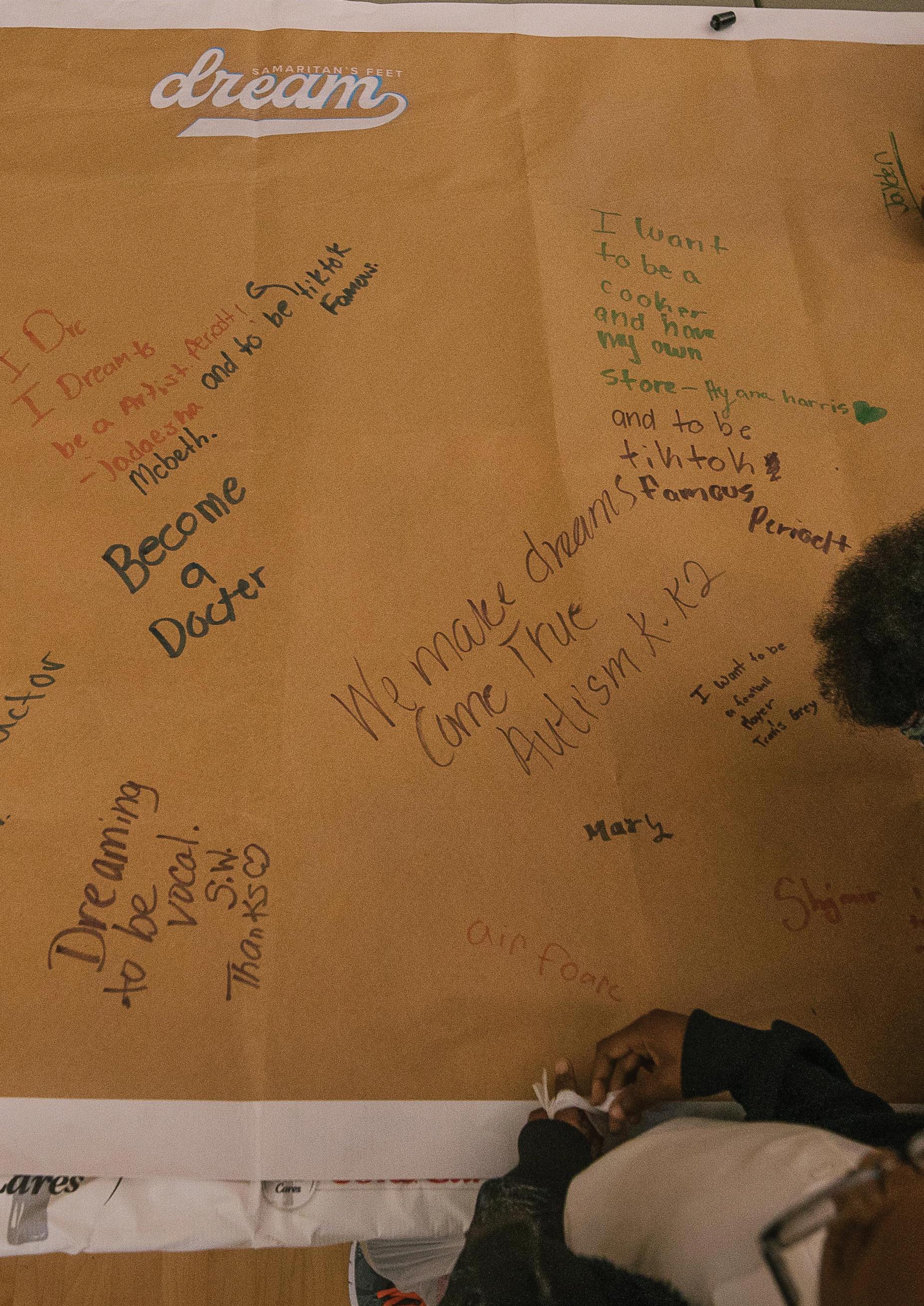 -SHIRLEY EMERSON VOLUNTEER, FERGUSON, MO
-SHIRLEY EMERSON VOLUNTEER, FERGUSON, MO
WHAT
“I’VE BEEN AT THIS COMMUNITY EVENT THE LAST THREE YEARS WITH THIS WONDERFUL ORGANIZATION AND IT IS MAKING A TREMENDOUS DIFFERENCE IN OUR COMMUNITY. IT’S NEIGHBORS HELPING NEIGHBORS. IT IS ABSOLUTELY IMPORTANT FOR KIDS TO DREAM BECAUSE THE DREAM IS
CARRIES US. THE DREAM IS WHAT YOU HAVE TO LOOK FORWARD TO. OUR KIDS HAVE TO LOOK FORWARD TO TOMORROW.”
ONE STEP CLOSER
TO HOME
“We feel so blessed to receive shoes that will literally change our patients’ lives! We see so much progress, goals met, and miracles happen through each pair of shoes that we are able to give to a child who is recovering in our Rehabilitation Unit,” Brianna McAlpine, Recreational Therapist, LRT/CTRS, Atrium Health Levine Children’s Pediatric Rehabilitation program, said.
The Levine Children’s Pediatric Rehabilitation program serves infants to teenagers from all over the southeastern United States who have had any life-altering illness or injury. Most patients who come to the rehab program have one of the following diagnoses: brain or spinal cord injury, neurological condition, amputation, orthopedic injury, or oncology illness. Patients go there to re-learn how to do a variety of day-to-day tasks like walking, using a wheelchair, talking, and most importantly, being a child and playing.
When Samaritan’s Feet heard there was a dire need for tennis shoes for patients in this Rehabilitation program, they jumped right in.
“Within 48 hours of finding out they had an immediate need, we had a commitment from the Central Intercollegiate Athletic Association (CIAA) and the Crown Jewels Chapter of The Links to provide them with 100 pairs of shoes,” Shannon Harris, Associate Director of Missions, Samaritan’s Feet, said.
The shoes were ready. They were ready for drop-off. They were ready to be worn. They were ready to help children who are fighting to be children.
“Our patients and team members were so excited to welcome the donation [of shoes]! I put together a small ‘welcome team’ to make sure that we were able to convey just how thankful we were. Our patients helped design the thank you poster, right down to the footprints made with paint,” McAlpine said.
She added, “We had one patient who was so excited to be a part of the welcome team, she had us help her put on a special dress and do her hair and makeup during a therapy session that morning so she would look beautiful in the pictures (those are her words)!”
The ‘welcome team’ cheered as the Samaritan’s Feet team arrived at Levine Children’s Hospital, filling the driveway with joy.
“You could just feel happiness all around. There were tears of joy flowing from staff. That moment filled my heart. It was a life-changing moment in such a brief amount of time,” Harris said.
The staff at the Levine Children’s Pediatric Rehabilitation program were so joyful because they knew how meaningful this simple shoe drop-off was to their patients.
With the addition of COVID-19, hardships have become even more difficult. McAlpine noted that it’s been a challenge to find and accept donations for their facility, while at the same time, family members and caregivers are hesitant to leave the hospital to get items (like shoes) for the patient because they want to ensure they don’t bring any unnecessary germs back into the hospital.
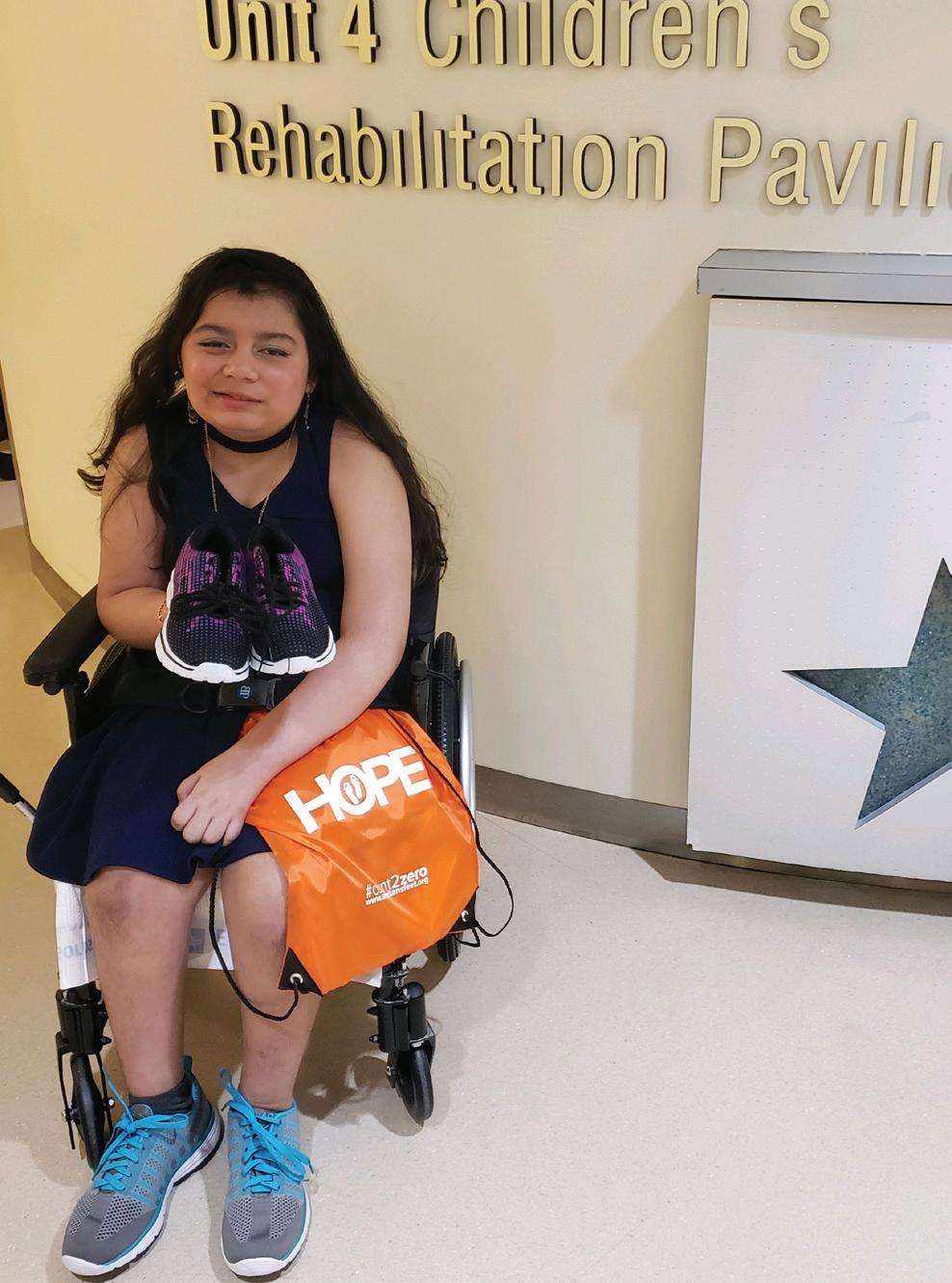
ATRIUM HEALTH RECEIVES SHOES FOR PATIENTS FROM CIAA AND CROWN JEWELS.
“These shoes are one less thing that the parents and patients have to worry about in the midst of some of the most trying times of their lives,” McAlpine said. “It means that they are able to start working on standing and walking within the first few days of their rehabilitation. Parents and caregivers don’t have to worry about trying to come up with the money to purchase shoes for their child and don’t have to worry about leaving their child alone at the hospital to travel home to get their shoes.”
McAlpine added, “Each pair of shoes that we are able to provide helps us start to improve the health of our patients immediately when they get to our unit. These shoes help get our patients get back on their feet and one step closer to home.”
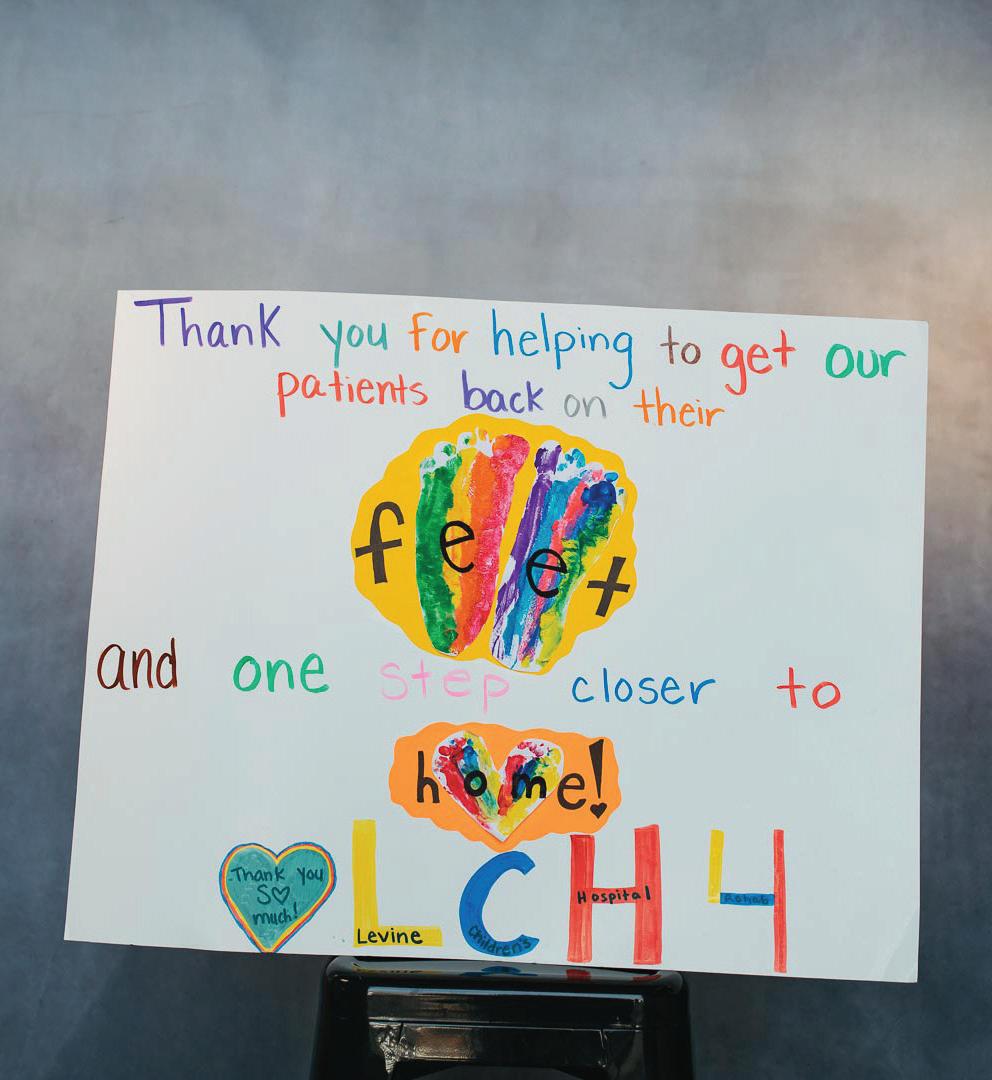
GETTING CREATIVE IN SOUTH AFRICA
“Your life matters.” This is the message that Elanie Fourie, CEO and Chairman of Samaritan’s Feet South Africa, and her team strive to spread. While the outbreak of COVID-19 has limited a lot of personal interactions worldwide, the Samaritan’s Feet team in South Africa has only been strengthened by it. Instead of becoming discouraged, Fourie and her team adapted, creating a new “normal” focused on connection and raising awareness.
Fourie said that COVID-19 taught her and her team many lessons, including working creatively alongside other nonprofit organizations. Like many of the shoe distributions in the U.S., the South Africa team typically holds their distributions inside school buildings. However, because many schools are closed or not allowing visitors due to the pandemic, Fourie and her team have had to be resourceful.
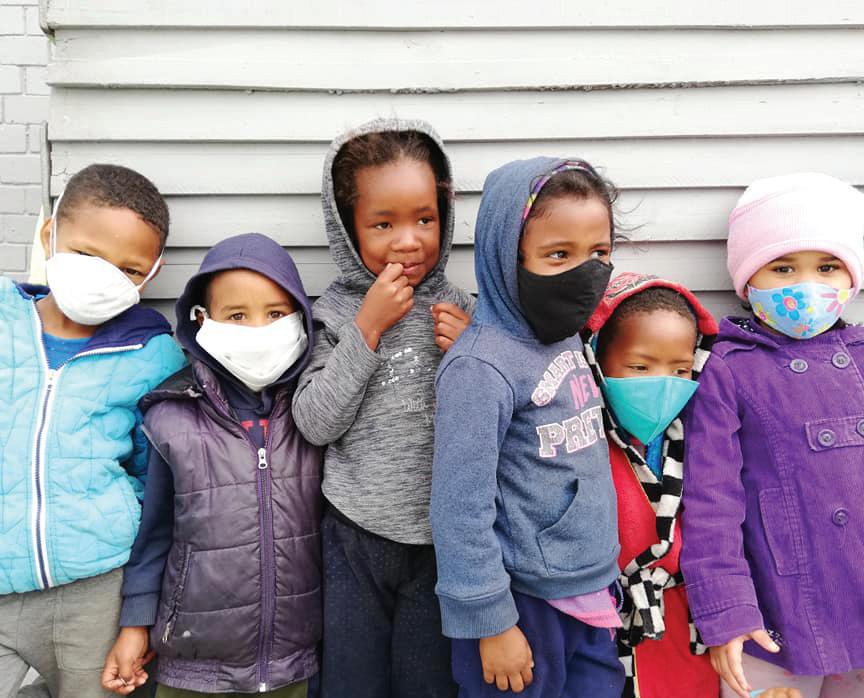
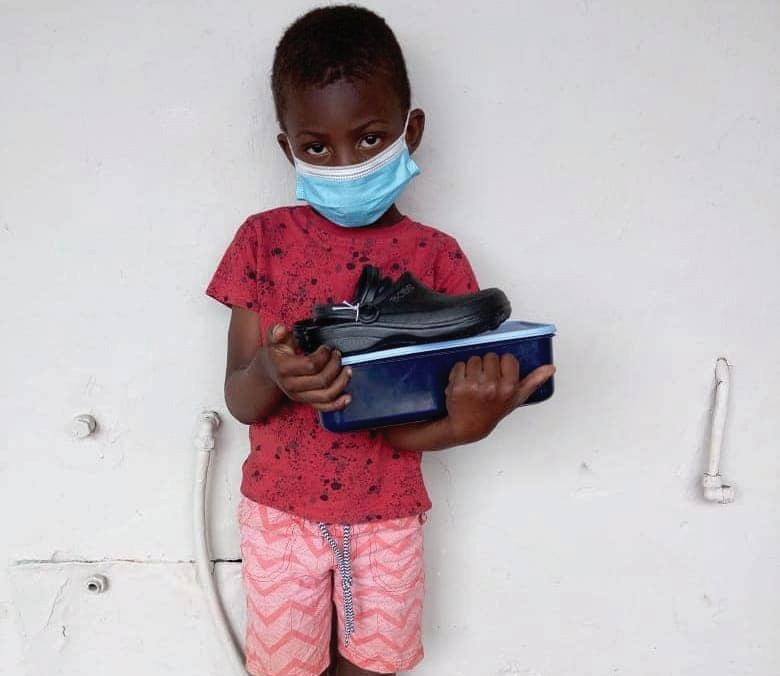
“We went into communities and took hands with other NGO’s, churches, or community leaders and we simply served on the corner of streets, in the backyards of informal settings, in people’s houses, under a tree, just wherever we could find space,” Fourie said.
This creativity and flexibility has allowed Fourie and her team to reach more people than ever before. Fourie and her team have served more people in the past six months than the past four years put together as they distributed 7,500 pairs of shoes during these COVID-19 months.
Since the pandemic began, Fourie says that South Africans have become more aware of the need in their community. In August, Fourie and her team celebrated Women’s Month, elevating the voices of women and girls in their community. “I understand the pressures of life, work, parenting, and being a [wife]. We have so much to juggle! Serving on a team where we are women loving and serving God, is super special to me. I know we are busy with Kingdom work,” Fourie said.
“Kingdom work.”
For Fourie and her team, this means being diligent servants.
With open hands and open hearts, the South Africa team is making connections and inspiring those around them. To Fourie, shoes mean hope, love, and opportunity. This is also what a pair of shoes meant to Samaritan’s Feet co-founder, Manny Ohonme, and it will continue to mean that for millions more.
Through the gratitude of those she serves, Fourie knows that the work her team does in South Africa is meaningful, saying it “humbles her,” bringing her back for more. When asked what she wants people to know about the individuals she serves, Fourie said, “I want people to know that the people we serve matter.”
Fourie added, “[Every] person has a dream and no matter what the living conditions are, no matter what the future might look like, your life matters!”
SHOES:A BLESSING FOR THE FAMILY
Brothers Edwin Alexander and Henry Estuardo Reyes live in the Los Limones community in Guatemala. They work in agriculture and their workday begins at 5 a.m. and ends 13 hours later at 6 p.m. During a typical day of work, they earn approximately 40 GTQ, equivalent to $5 USD.
Edwin lives with his brother, wife, and two children in a small home with dirt floors and makeshift walls. He says he does the best he can with what he earns each day and the priority is feeding his family.
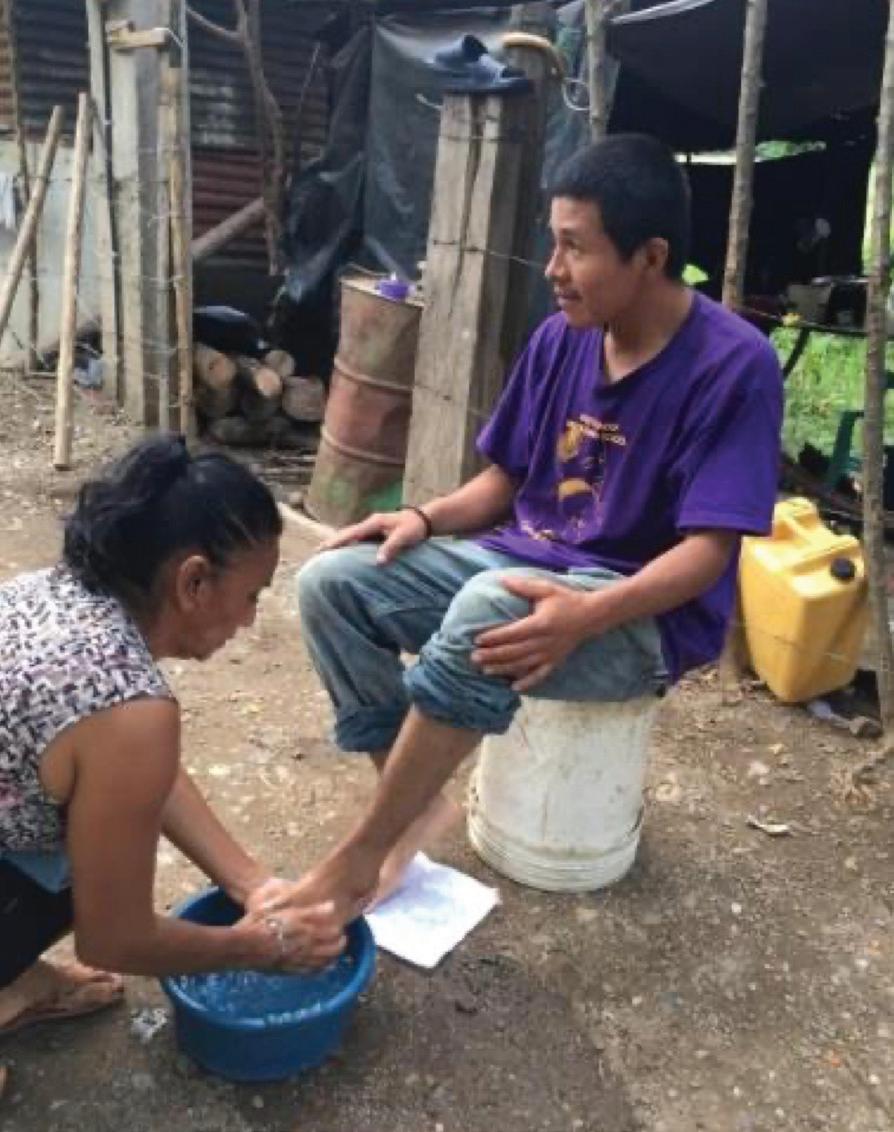

“Life is hard for us here, but we do what we can,” Edwin said. “Each day, my brother and I go out to work for 12 hours, barefoot, working in the fields. We come home with swollen feet and ankles and very tired. But that’s what we have to do for our family. We had one pair of shoes that we shared between the both of us. Anything outside of food is just not a priority for us because we can only do so much with what we earn.”
Stories such as the Reyes brothers’ are very common in Guatemala. Families living in rural areas don’t see a lot of help, so they have to go out and seek it.
After the Reyes brothers met with the Cultural Association and Evangelist Redemption Center, case workers went to assess the needs of the Reyes family.
Soon after, the family was given shoes, food, and clothing. Before giving the brothers the shoes, the case workers washed the beneficiaries’ feet as a sign of humility and prayed with Edwin and Henry.
The Reyes brothers were very grateful. They explained that the shoes will allow them to work harder and stand longer to earn more money. That they will be a blessing for their family.
Samaritan’s Feet partnered with Food for the Poor to make this story possible. Food for the Poor is one of the largest international relief and development organizations the United States, and Samaritan’s Feet is honored to partner with them to distribute hundreds of thousands of shoes.
THANK YOU




We truly couldn’t have done any of this without your support. The stories you have read in these pages all happened because of the generosity of our donors, volunteers, and partners below. Thank you for the continued confidence in our mission of creating a world with zero shoeless children. We can’t wait to continue serving with you in 2021.





 SANDI MOORE PHILANTHROPY
SANDI MOORE PHILANTHROPY






















 PIERRE DESIR FOUNDATION
PIERRE DESIR FOUNDATION














BROUGHT TO YOU BY
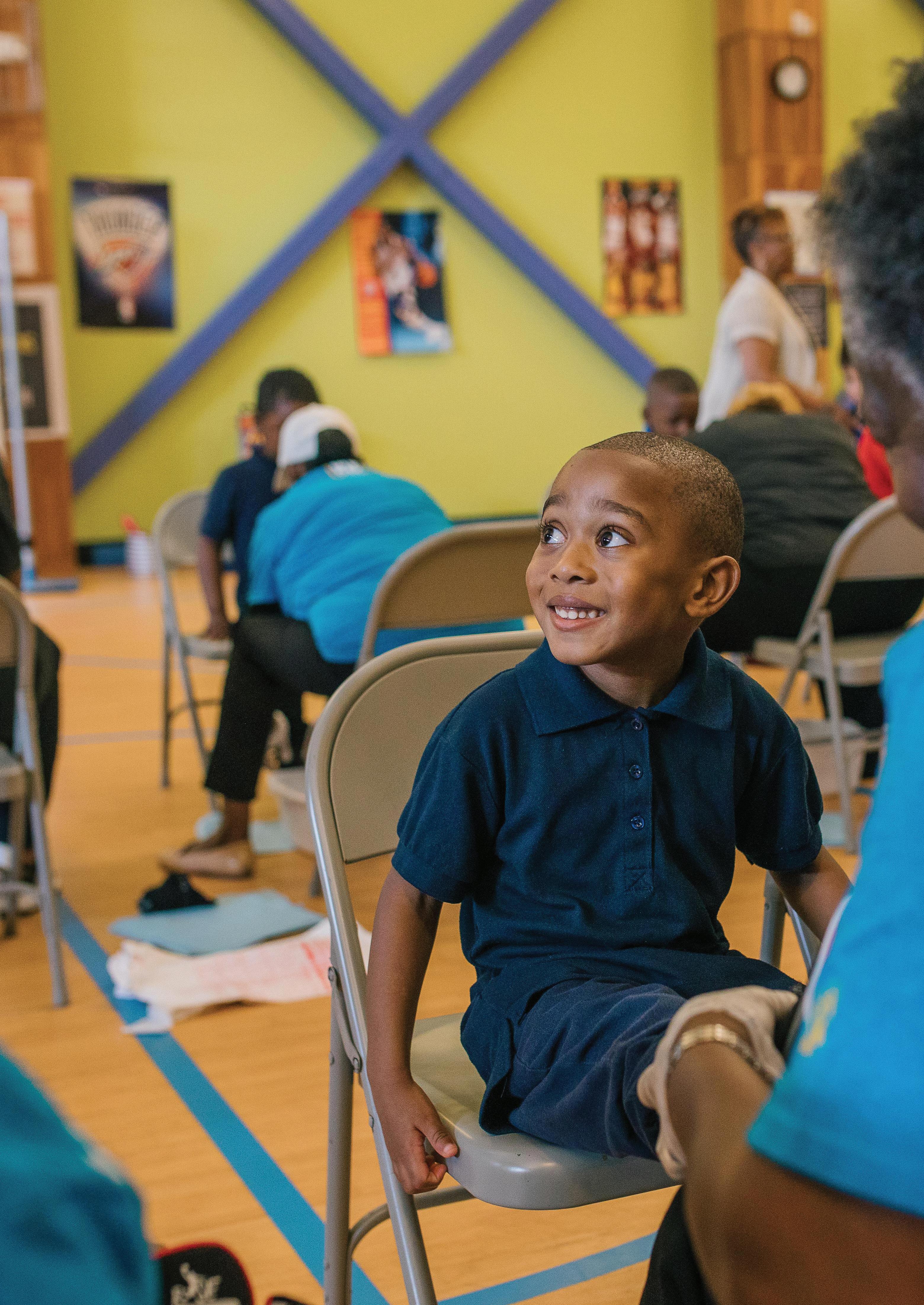
The Sole Society is a group of people whose consistent support of the organization empowers Samaritan’s Feet to give hope to those in need. Recurring donors who give monthly or quarterly are part of this community and are all connected to one another as together, they enable our organization to connect to millions around the world.
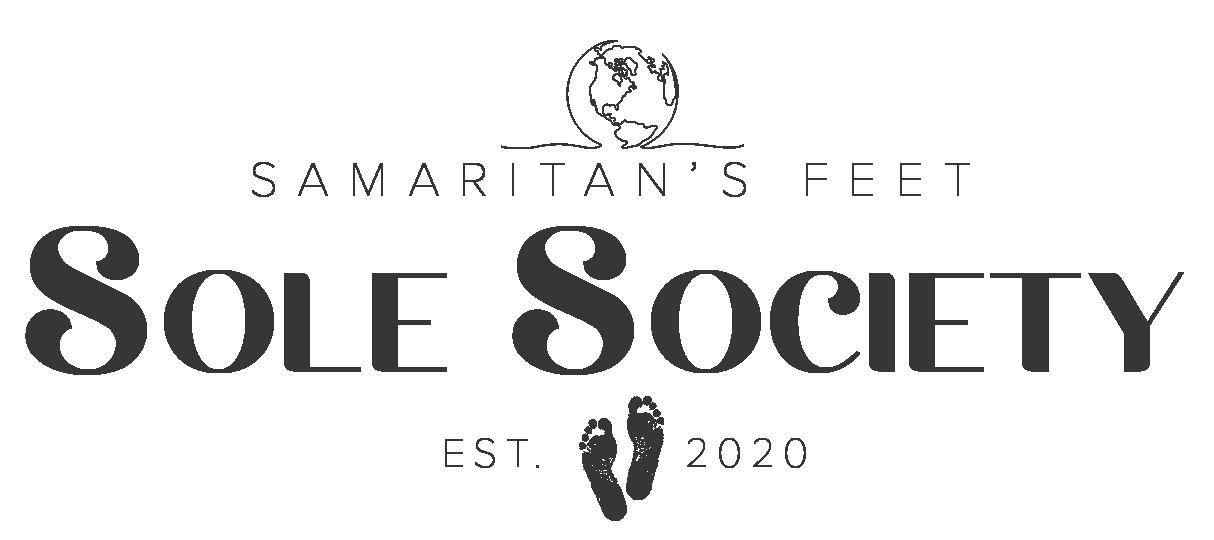


Join Today!









 MANNY OHONME CO-FOUNDER
MANNY OHONME CO-FOUNDER





















 Appalachia: A Report By the President’s Appalachian Regional Commission, 1964.
Appalachia: A Report By the President’s Appalachian Regional Commission, 1964.
















 DR. OBINNA & NGOZI ORIAKU KEVIN & LEANN EGOLF
RYAN & KATRINA HUTCHINS
DR. MATT & DR. MEG LINEBERGER
DR. KENNY & FEMI TOKUNBOH
CHELSEA BELCHER
PIERRE DESIR MICHAEL BROUSE
DR. OBINNA & NGOZI ORIAKU KEVIN & LEANN EGOLF
RYAN & KATRINA HUTCHINS
DR. MATT & DR. MEG LINEBERGER
DR. KENNY & FEMI TOKUNBOH
CHELSEA BELCHER
PIERRE DESIR MICHAEL BROUSE

























 -SHIRLEY EMERSON VOLUNTEER, FERGUSON, MO
-SHIRLEY EMERSON VOLUNTEER, FERGUSON, MO














 SANDI MOORE PHILANTHROPY
SANDI MOORE PHILANTHROPY



















 PIERRE DESIR FOUNDATION
PIERRE DESIR FOUNDATION













